greek
ALEXANDER III the GREAT 323 B. C. Gold Stater Authentic Ancient Greek Coin NGC MS
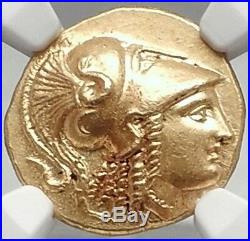
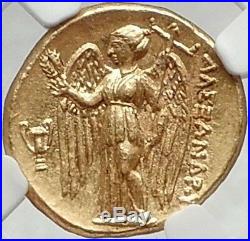
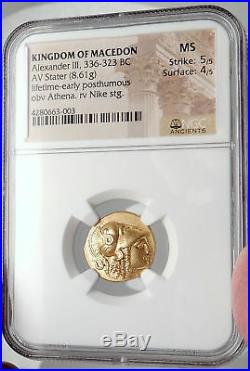


[6629] KINGS of MACEDON. Alexander III the Great – King of Macedonia: 336-323 B. Gold Stater 19mm (8.61 grams) Amphipolis mint, struck circa 325-319 BC. Reference: Price 168; Vgl. 110 Certification: NGC Ancients MS Strike: 5/5 Surface: 4/5 4280663-003 Head of Athena right, wearing crested Attic helmet decorated with coiled serpent. Nike standing left, holding wreath and stylis; kantharos in left field. Best known as Alexander the Great , he was a king (basileus in Greek) of the Ancient Greek kingdom of Macedonia. He was born in the city of Pella in 356 BC. By age 20, Alexander succeeded his father Philip II to the throne as king. He spent most of his years as king in an unprecedented military campaign of conquest through Asia, northeast Africa and even reached India. By age 30 he created one of the biggest empires in the ancient world, reaching from Greece to northwestern India. Being undefeated in battle, many consider him as one of history’s most successful military commanders. He could be considered one of history’s most important figures, having spread the Greek civilization far and wide, and was even admired by Julius Caesar along with many other important historical personages as well. Alexander III of Macedon (20/21 July 356 BC – 10/11 June 323 BC), commonly known as Alexander the Great , was a king (basileus) of the Ancient Greek kingdom of Macedon and a member of the Argead dynasty. Born in Pella in 356 BC, Alexander succeeded his father, Philip II, to the throne at the age of twenty. He spent most of his ruling years on an unprecedented military campaign through Asia and northeast Africa, and by the age of thirty he had created one of the largest empires of the ancient world, stretching from Greece to northwestern India. He was undefeated in battle and is widely considered one of history’s most successful military commanders. During his youth, Alexander was tutored by the philosopher Aristotle until the age of 16. After Philip’s assassination in 336 BC, Alexander succeeded his father to the throne and inherited a strong kingdom and an experienced army. Alexander was awarded the generalship of Greece and used this authority to launch his father’s Panhellenic project to lead the Greeks in the conquest of Persia. In 334 BC, he invaded the Achaemenid Empire, and began a series of campaigns that lasted ten years. Following the conquest of Asia Minor, Alexander broke the power of Persia in a series of decisive battles, most notably the battles of Issus and Gaugamela. He subsequently overthrew the Persian King Darius III and conquered the Achaemenid Empire in its entirety. At that point, his empire stretched from the Adriatic Sea to the Indus River. Seeking to reach the “ends of the world and the Great Outer Sea”, he invaded India in 326 BC, but eventually turned back at the demand of his homesick troops. Alexander died in Babylon in 323 BC, the city he planned to establish as his capital, without executing a series of planned campaigns that would have begun with an invasion of Arabia. In the years following his death, a series of civil wars tore his empire apart, resulting in several states ruled by the Diadochi, Alexander’s surviving generals and heirs. Alexander’s legacy includes the cultural diffusion his conquests engendered, such as Greco-Buddhism. He founded some twenty cities that bore his name, most notably Alexandria in Egypt. Alexander’s settlement of Greek colonists and the resulting spread of Greek culture in the east resulted in a new Hellenistic civilization, aspects of which were still evident in the traditions of the Byzantine Empire in the mid-15th century and the presence of Greek speakers in central and far eastern Anatolia until the 1920s. Alexander became legendary as a classical hero in the mold of Achilles, and he features prominently in the history and mythic traditions of both Greek and non-Greek cultures. He became the measure against which military leaders compared themselves, and military academies throughout the world still teach his tactics. He is often ranked among the most influential people in human history, along with his teacher Aristotle. The item “ALEXANDER III the GREAT 323 B. C. Gold Stater Authentic Ancient Greek Coin NGC MS” is in sale since Wednesday, November 14, 2018. This item is in the category “Coins & Paper Money\Coins\ Ancient\Greek (450 BC-100 AD)”. The seller is “victoram” and is located in Forest Hills, New York. This item can be shipped worldwide.
- Culture: Greek
- Coin Type: Ancient
- Material: Gold
- Certification Number: 4280663-003
- Certification: NGC 5/5; 4/5
- Grade: MS
- Composition: Gold
- Denomination: Stater

Brutus Julius Caesar Roman Assassin 44BC Ancient Greek GOLD Coin NGC MS i68143
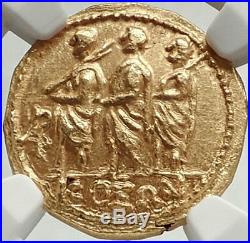
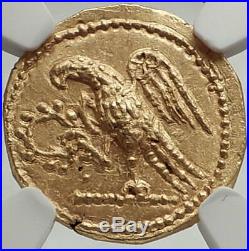
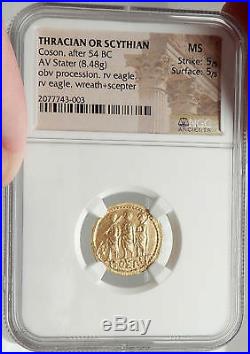
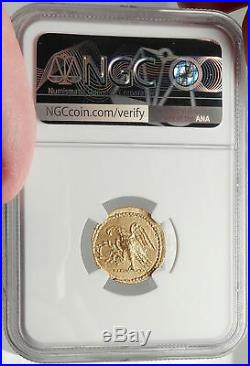
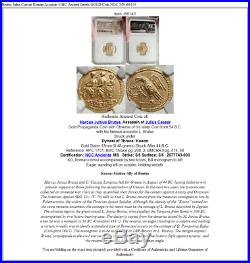

Authentic Ancient Coin of. Assassin of Julius Caesar. Gold Propaganda Coin with Obverse of his silver Coin from 54 B. With his famous ancestor L. Brutus Struck under: Dynast of Thrace: Koson Gold Stater 17mm (8.48 grams) Struck After 44 B. Reference: RPC 1701; BMC Thrace pg. 208, 2; BMCRR II pg. 474, 48 Certification: NGC Ancients. MS Strike: 5/5 Surface: 5/5 2077743-003 KO , Roman consul accompanied by two lictors; BR monogram to left Eagle standing left on sceptre, holding wreath. Koson: Golden Ally of Brutus. Marcus Junius Brutus and C. Cassius Longinus left for Greece in August of 44 BC, having failed to win popular support at Rome following the assassination of Caesar. In the next two years the tyrannicides collected an immense war chest as they assembled their forces for the contest against Antony and Octavian. The historian Appian Bell. 75 tells us that L. Brutus struck from the treasures consigned to him by Polemocratia, the widow of the Thracian dynast Sadalas. Although the identity of the “Koson” named on the coins remains uncertain, the coinage in his name must be the coinage of L. Brutus described by Appian. The obverse depicts the great consul L. Junius Brutus, who expelled the Tarquins from Rome in 509 BC, accompanied by two lictors bearing axes. The design is copied from the denarius issued by M. Junius Brutus when he was a moneyer in 54 BC (Crawford 433/1). The reverse, an eagle standing on a sceptre and holding a victory wreath, was evidently a standard type at Rome and occurs on the coinage of Q. Pomponius Rufus (Crawford 398/1). The monogram is to be read as BR or LBR Brutus or L. The designs express Brutus’ propaganda in the civil war perfectly: the obverse represents the historic fight against tyranny, and the reverse represents the victorious Roman eagle. Lucius Junius Brutus was the founder of the Roman Republic and traditionally one of the first consuls in 509 BC. He was claimed as an ancestor of the Roman gens Junia, including Decimus Junius Brutus and Marcus Junius Brutus, the most famous of Julius Caesar’s assassins. Prior to the establishment of the Roman Republic, Rome had been ruled by kings. Brutus led the revolt that overthrew the last king, Lucius Tarquinius Superbus, after the rape of the noblewoman (and kinswoman of Brutus) Lucretia at the hands of Tarquin’s son Sextus Tarquinius. The account is from Livy’s Ab urbe condita and deals with a point in the history of Rome prior to reliable historical records (virtually all prior records were destroyed by the Gauls when they sacked Rome under Brennus in 390 BC or 387 BC). Overthrow of the Monarchy. Lucius Iunius Brutus, on right. Main article: Overthrow of the Roman monarchy. Brutus was the son of Tarquinia, daughter of Rome’s fifth king Lucius Tarquinius Priscus and sister to Rome’s seventh king Tarquinius Superbus. According to Livy, Brutus had a number of grievances against his uncle the king, amongst them was the fact that Tarquin had put to death a number of the chief men of Rome, including Brutus’ brother. Brutus avoided the distrust of Tarquin’s family by feigning slow-wittedness (in Latin brutus translates to dullard). He accompanied Tarquin’s sons on a trip to the Oracle of Delphi. The sons asked the oracle who would be the next ruler of Rome. The Oracle responded the next person to kiss his mother would become king. Brutus interpreted “mother” to mean the Earth, so he pretended to trip and kissed the ground. Brutus, along with Spurius Lucretius Tricipitinus, Publius Valerius Publicola, and Lucius Tarquinius Collatinus were summoned by Lucretia to Collatia after she had been raped by Sextus Tarquinius, the son of the king Tarquinius Superbus. Lucretia, believing that the rape dishonored her and her family, committed suicide by stabbing herself with a dagger after telling of what had befallen her. According to legend, Brutus grabbed the dagger from Lucretia’s breast after her death and immediately shouted for the overthrow of the Tarquins. The four men gathered the youth of Collatia, then went to Rome where Brutus, being at that time Tribunus Celerum , summoned the people to the forum and exhorted them to rise up against the king. The people voted for the deposition of the king, and the banishment of the royal family. Brutus, leaving Lucretius in command of the city, proceeded with armed men to the Roman army then camped at Ardea. The king, who had been with the army, heard of developments at Rome, and left the camp for the city before Brutus’ arrival. The army received Brutus as a hero, and the king’s sons were expelled from the camp. Tarquinius Superbus, meanwhile, was refused entry at Rome, and fled with his family into exile. The Oath of Brutus. According to Livy, Brutus’ first act after the expulsion of Lucius Tarquinius Superbus was to bring the people to swear an oath never to allow any man again to be king in Rome. Omnium primum avidum novae libertatis populum, ne postmodum flecti precibus aut donis regiis posset, iure iurando adegit neminem Romae passuros regnare. First of all, by swearing an oath that they would suffer no man to rule Rome, it forced the people, desirous of a new liberty, not to be thereafter swayed by the entreaties or bribes of kings. This is, fundamentally, a restatement of the’private oath’ sworn by the conspirators to overthrow the monarchy. Castissimum ante regiam iniuriam sanguinem iuro, vosque, di, testes facio me L. Tarquinium Superbum cum scelerata coniuge et omni liberorum stirpe ferro igni quacumque dehinc vi possim exsecuturum, nec illos nec alium quemquam regnare Romae passurum. There is no scholarly agreement that the oath took place; it is reported, although differently, by Plutarch (Poplicola , 2) and Appian B. Brutus and Lucretia’s bereaved husband, Lucius Tarquinius Collatinus, were elected as the first consuls of Rome (509 BC). However, Tarquinius was soon replaced by Publius Valerius Publicola. Brutus’ first acts during his consulship, according to Livy, included administering an oath to the people of Rome to never again accept a king in Rome (see above) and replenishing the number of senators to 300 from the principal men of the equites. During his consulship the royal family made an attempt to regain the throne, firstly by their ambassadors seeking to subvert a number of the leading Roman citizens in the Tarquinian conspiracy. Amongst the conspirators were two brothers of Brutus’ wife Vitellia, and Brutus’ two sons, Titus Junius Brutus and Tiberius Junius Brutus. The conspiracy was discovered and the consuls determined to punish the conspirators with death. Brutus gained respect for his stoicism in watching the execution of his own sons, even though he showed emotion during the punishment. Tarquin again sought to retake the throne soon after at the Battle of Silva Arsia, leading the forces of Tarquinii and Veii against the Roman army. Valerius led the infantry, and Brutus led the cavalry. Aruns, the king’s son, led the Etruscan cavalry. The cavalry first joined battle and Aruns, having spied from afar the lictors, and thereby recognizing the presence of a consul, soon saw that Brutus was in command of the cavalry. The two men, who were cousins, charged each other, and speared each other to death. The infantry also soon joined the battle, the result being in doubt for some time. The right wing of each army was victorious, the army of Tarquinii forcing back the Romans, and the Veientes being routed. However the Etruscan forces eventually fled the field, the Romans claiming the victory. The surviving consul, Valerius, after celebrating a triumph for the victory, held a funeral for Brutus with much magnificence. The Roman noblewomen mourned him for one year, for his vengeance of Lucretia’s violation. Brutus in literature and art. The Lictors Bring to Brutus the Bodies of His Sons by David, 1789. Lucius Junius Brutus is quite prominent in English literature, and he was quite popular among British and American Whigs. A reference to L. Brutus is in the following lines from Shakespeare’s play The Tragedie of Julius Cæsar , (Cassius to Marcus Brutus, Act 1, Scene 2). O, you and I have heard our fathers say, There was a Brutus once that would have brooktTh’eternal devil to keep his state in RomeAs easily as a king. One of the main charges of the senatorial faction that plotted against Julius Caesar after he had the Roman Senate declare him dictator for life, was that he was attempting to make himself a king, and a co-conspirator Cassius, enticed Brutus’ direct descendant, Marcus Junius Brutus, to join the conspiracy by referring to his ancestor. Brutus is a leading character in Shakespeare’s Rape of Lucrece and in Nathaniel Lee’s Restoration tragedy (1680), Lucius Junius Brutus; Father of his Country. In The Mikado , Nanki-poo refers to his father as “the Lucius Junius Brutus of his race”. The memory of L. Brutus also had a profound impact on Italian patriots, including those who established the ill-fated Roman Republic in February 1849. Brutus was a hero of republicanism during the Enlightenment and Neoclassical periods. In 1789, at the dawn of the French Revolution, master painter Jacques-Louis David publicly exhibited his politically charged masterwork, The Lictors Bring to Brutus the Bodies of His Sons , to great controversy. Marcus Junius Brutus (early June, 85 BC – late October, 42 BC), often referred to as Brutus , was a politician of the late Roman Republic. He is best known in modern times for taking a leading role in the assassination of Julius Caesar. Marcus Junius Brutus the Younger was the son of Marcus Junius Brutus the Elder and Servilia Caepionis. His father was killed by Pompey the Great in dubious circumstances after he had taken part in the rebellion of Lepidus; his mother was the half-sister of Cato the Younger, and later Julius Caesar’s mistress. Some sources refer to the possibility of Caesar being his real father, despite Caesar’s being only 15 years old when Brutus was born. Brutus’ uncle, Quintus Servilius Caepio, adopted him in about 59 BC, and Brutus was known officially for a time as Quintus Servilius Caepio Brutus before he reverted to using his birth-name. Following Caesar’s assassination in 44 BC, Brutus revived his adoptive name in order to illustrate his links to another famous tyrannicide, Gaius Servilius Ahala, from whom he was descended. Brutus held his uncle in high regard and his political career started when he became an assistant to Cato, during his governorship of Cyprus. From his first appearance in the Senate, Brutus aligned with the Optimates (the conservative faction) against the First Triumvirate of Marcus Licinius Crassus, Gnaeus Pompeius Magnus and Gaius Julius Caesar. When civil war broke out in 49 BC between Pompey and Caesar, Brutus followed his old enemy and present leader of the Optimates, Pompey. When the Battle of Pharsalus began, Caesar ordered his officers to take Brutus prisoner if he gave himself up voluntarily, and if he persisted in fighting against capture, to let him alone and do him no violence. After the disaster of the Battle of Pharsalus, Brutus wrote to Caesar with apologies and Caesar immediately forgave him. Caesar then accepted him into his inner circle and made him governor of Gaul when he left for Africa in pursuit of Cato and Metellus Scipio. In 45 BC, Caesar nominated Brutus to serve as urban praetor for the following year. Also, in June 45 BC, Brutus divorced his wife and married his first cousin, Porcia Catonis, Cato’s daughter. According to Cicero the marriage caused a semi-scandal as Brutus failed to state a valid reason for his divorce from Claudia other than he wished to marry Porcia. The marriage also caused a rift between Brutus and his mother, who resented the affection Brutus had for Porcia. Assassination of Julius Caesar (44 BC). Main article: Assassination of Julius Caesar. Death of Caesar by Vincenzo Camuccini. Around this time, many senators began to fear Caesar’s growing power following his appointment as dictator for life. Brutus was persuaded into joining the conspiracy against Caesar by the other senators. Eventually, Brutus decided to move against Caesar after Caesar’s king-like behavior prompted him to take action. His wife was the only woman privy to the plot. The conspirators planned to carry out their plot on the Ides of March (March 15) that same year. On that day, Caesar was delayed going to the Senate because his wife, Calpurnia Pisonis, tried to convince him not to go. The conspirators feared the plot had been found out. Brutus persisted, however, waiting for Caesar at the Senate, and allegedly still chose to remain even when a messenger brought him news that would otherwise have caused him to leave. When Caesar finally did come to the Senate, they attacked him. Publius Servilius Casca Longus was allegedly the first to attack Caesar with a blow to the shoulder, which Caesar blocked. However, upon seeing Brutus was with the conspirators, he covered his face with his toga and resigned himself to his fate. The conspirators attacked in such numbers that they even wounded one another. Brutus is said to have been wounded in the hand and in the legs. After the assassination, the Senate passed an amnesty on the assassins. This amnesty was proposed by Caesar’s friend and co-consul Marcus Antonius. Nonetheless, uproar among the population caused Brutus and the conspirators to leave Rome. Brutus settled in Crete from 44 to 42 BC. In 43 BC, after Octavian received his consulship from the Roman Senate, one of his first actions was to have the people that had assassinated Julius Caesar declared murderers and enemies of the state. Marcus Tullius Cicero, angry at Octavian, wrote a letter to Brutus explaining that the forces of Octavian and Marcus Antonius were divided. Antonius had laid siege to the province of Gaul, where he wanted a governorship. In response to this siege, Octavian rallied his troops and fought a series of battles in which Antonius was defeated. Battle of Philippi (42 BC). Upon hearing that neither Antonius nor Octavian had an army big enough to defend Rome, Brutus rallied his troops, which totaled about 17 legions. When Octavian heard that Brutus was on his way to Rome, he made peace with Antonius. Their armies, which together totaled about 19 legions, marched to meet Brutus and Gaius Cassius Longinus. The two sides met in two engagements known as the Battle of Philippi. The first was fought on October 3, 42 BC, in which Brutus defeated Octavian’s forces, although Cassius was defeated by Antonius’ forces. The second engagement was fought on October 23, 42 BC and ended in Brutus’ defeat. After the defeat, he fled into the nearby hills with only about four legions. Knowing his army had been defeated and that he would be captured, Brutus committed suicide. Among his last words were, according to Plutarch, By all means must we fly; not with our feet, however, but with our hands. Brutus also uttered the well-known verse calling down a curse upon Antonius (Plutarch repeats this from the memoirs of Publius Volumnius): Forget not, Zeus, the author of these crimes (in the Dryden translation this passage is given as Punish, great Jove, the author of these ills). Plutarch wrote that, according to Volumnius, Brutus repeated two verses, but Volumnius was only able to recall the one quoted. Antonius, as a show of great respect, ordered Brutus’ body to be wrapped in Antonius’ most expensive purple mantle (this was later stolen and Antonius had the thief executed). Brutus was cremated, and his ashes were sent to his mother, Servilia Caepionis. His wife Porcia was reported to have committed suicide upon hearing of her husband’s death, although, according to Plutarch (Brutus 53 para 2), there is some dispute as to whether this is the case: Plutarch states that there is a letter in existence that was allegedly written by Brutus mourning the manner of her death. 85 BC: Brutus was born in Rome to Marcus Junius Brutus The Elder and Servilia Caepionis. 58 BC: He was made assistant to Cato, governor of Cyprus which helped him start his political career. 53 BC: He was given the quaestorship in Cilicia. 49 BC: Brutus followed Pompey to Greece during the civil war against Caesar. 48 BC: Brutus was pardoned by Caesar. 46 BC: He was made governor of Gaul. 45 BC: He was made Praetor. 44 BC: Murdered Caesar with other liberatores; went to Athens and then to Crete. 42 BC: Battle with Marcus Antonius’s forces. This was the noblest Roman of them all: All the conspirators save only he Did that they did in envy of great Caesar; He only, in a general honest thought And common good to all, made one of them. His life was gentle, and the elements So mix’d in him that Nature might stand up And say to all the world This was a man! William Shakespeare, Julius Caesar , Act 5, Scene 5 (Mark Antony). The phrase Sic semper tyrannis! Thus, ever (or always), to tyrants! Is attributed to Brutus at Caesar’s assassination. The phrase is also the official motto of the Commonwealth of Virginia. John Wilkes Booth, the assassin of Abraham Lincoln, claimed to be inspired by Brutus. Booth’s father, Junius Brutus Booth, was named for Brutus, and Booth (as Marcus Antonius) and his brother (as Brutus) had performed in a production of Julius Caesar in New York just six months before the assassination. On the night of the assassination, Booth is alleged to have shouted “Sic semper tyrannis” while leaping to the stage of Ford’s Theater. And why; For doing what Brutus was honored for… Booth was also known to be greatly attracted to Caesar himself, having played both Brutus and Caesar upon various stages. The well-known phrase Et tu, Brute? Is famous as Caesar’s utterance in the play Julius Caesar, although it is not his last words, and the sources describing Caesar’s death disagree about what his last words were. In Dante’s Inferno , Brutus is one of three people deemed sinful enough to be chewed in one of the three mouths of Satan, in the very center of Hell, for all eternity. The other two are Cassius, who was Brutus’s fellow conspirator and Judas Iscariot (Canto XXXIV). Dante condemned these three in the afterlife for being Treacherous Against Their Masters and enemies of the King/Emperor. Shakespeare’s play Julius Caesar depicts Caesar’s assassination by Brutus and his accomplices, and the murderers’ subsequent downfall. In the final scene, Marcus Antonius describes Brutus as “the noblest Roman of them all”, for he was the only conspirator who acted for the good of Rome. In the Masters of Rome novels of Colleen McCullough, Brutus is portrayed as a timid intellectual who hates Caesar for personal reasons, foremost of them the fact that his marriage arrangement with Caesar’s daughter, Julia, whom Brutus deeply loved, was dissolved in Caesar’s political gamble to give his daughter’s hand to Pompey to cement with him an alliance. Cassius and Trebonius use him as a figurehead because of his family connections, and his descendence from the founder of the Republic. He appears in Fortune’s Favourites , Caesar’s Women , Caesar and The October Horse. Ides of March is an epistolatory novel by Thornton Wilder dealing with characters and events leading to, and culminating in, the assassination of Julius Caesar. In the TV series Rome , Brutus, portrayed by Tobias Menzies, is depicted as a young man torn between what he believes is right, and his loyalty and love of a man who has been like a father to him. In the series, his personality and motives are accurate but Brutus’ relationship to Cassius and Cato is not mentioned, and his three sisters and wife Porcia are omitted from the series completely. Brutus is an occasional supporting character in Asterix comics, most notably Asterix and Son in which he is the main antagonist. The character appears in the live Asterix film adaptations – though briefly in the first two – Asterix and Obelix vs Caesar (played by Didier Cauchy) and Asterix at the Olympic Games. In the latter film, he is portrayed as a comical villain by Belgian actor Benoît Poelvoorde: he is a central character to the film, even though he was not depicted in the original Asterix at the Olympic Games comic book. Following sources cited in Plutarch, he is implied in that film to be Julius Caesar’s biological son. The Hives’ song “B is for Brutus” contains titular and lyrical references to Junius Brutus. The Roman Republic was the phase of the ancient Roman civilization characterized by a republican form of government. It began with the overthrow of the Roman monarchy, c. 509 BC, and lasted over 450 years until its subversion, through a series of civil wars, into the Principate form of government and the Imperial period. The Roman Republic was governed by a complex constitution, which centered on the principles of a separation of powers and checks and balances. The evolution of the constitution was heavily influenced by the struggle between the aristocracy (the patricians), and other talented Romans who were not from famous families, the plebeians. Early in its history, the republic was controlled by an aristocracy of individuals who could trace their ancestry back to the early history of the kingdom. Over time, the laws that allowed these individuals to dominate the government were repealed, and the result was the emergence of a new aristocracy which depended on the structure of society, rather than the law, to maintain its dominance. During the first two centuries, the Republic saw its territory expand from central Italy to the entire Mediterranean world. In the next century, Rome grew to dominate North Africa, the Iberian Peninsula, Greece, and what is now southern France. During the last two centuries of the Roman Republic, it grew to dominate the rest of modern France, as well as much of the east. At this point, the republican political machinery was replaced with imperialism. The precise event which signaled the end of the Roman Republic and the transition into the Roman Empire is a matter of interpretation. Towards the end of the period a selection of Roman leaders came to so dominate the political arena that they exceeded the limitations of the Republic as a matter of course. Historians have variously proposed the appointment of Julius Caesar as perpetual dictator in 44 BC, the defeat of Mark Antony at the Battle of Actium in 31 BC, and the Roman Senate’s grant of extraordinary powers to Octavian (Augustus) under the first settlement in 27 BC, as candidates for the defining pivotal event ending the Republic. Many of Rome’s legal and legislative structures can still be observed throughout Europe and the rest of the world by modern nation state and international organizations. The Romans’ Latin language has influenced grammar and vocabulary across parts of Europe and the world. World-renowned expert numismatist, enthusiast, author and dealer in authentic ancient Greek, ancient Roman, ancient Byzantine, world coins & more. Ilya Zlobin is an independent individual who has a passion for coin collecting, research and understanding the importance of the historical context and significance all coins and objects represent. Send me a message about this and I can update your invoice should you want this method. Getting your order to you, quickly and securely is a top priority and is taken seriously here. Great care is taken in packaging and mailing every item securely and quickly. What is a certificate of authenticity and what guarantees do you give that the item is authentic? You will be very happy with what you get with the COA; a professional presentation of the coin, with all of the relevant information and a picture of the coin you saw in the listing. Additionally, the coin is inside it’s own protective coin flip (holder), with a 2×2 inch description of the coin matching the individual number on the COA. Whether your goal is to collect or give the item as a gift, coins presented like this could be more prized and valued higher than items that were not given such care and attention to. When should I leave feedback? Please don’t leave any negative feedbacks, as it happens sometimes that people rush to leave feedback before letting sufficient time for their order to arrive. The matter of fact is that any issues can be resolved, as reputation is most important to me. My goal is to provide superior products and quality of service. How and where do I learn more about collecting ancient coins? Visit the Guide on How to Use My Store. For on an overview about using my store, with additional information and links to all other parts of my store which may include educational information on topics you are looking for. The item “Brutus Julius Caesar Roman Assassin 44BC Ancient Greek GOLD Coin NGC MS i68143″ is in sale since Tuesday, April 2, 2019. This item is in the category “Coins & Paper Money\Coins\ Ancient\Greek (450 BC-100 AD)”. The seller is “highrating_lowprice” and is located in Rego Park, New York. This item can be shipped worldwide.
- Culture: Greek
- Certification Number: 2077743-003
- Certification: NGC
- Grade: MS
- Composition: Gold
- Coin Type: Ancient

SYRACUSE in SICILY under Tyrant AGATHOKLES Electrum Ancient Greek Coin APOLLO
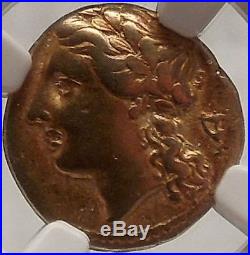
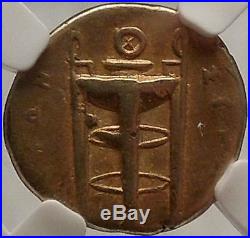
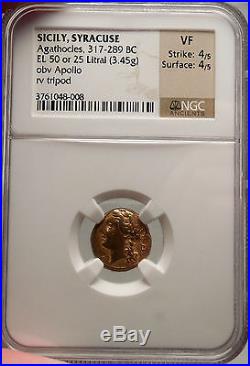


[5934] Greek city of Syracuse in Sicily under Tyrant Agathokles Electrum Dekadrachm or 50 Litrai 15mm (3.45 grams) Struck circa 310-300 B. Reference: HGC 2, 1294; BAR Issue 10. BMC 263 (same dies); Jenkins Group B; (O4/R1). SNG ANS 621 Certification: NGC Ancients VF Strike: 4/5 Surface: 4/5 3761048-008 Laureate head of Apollo to left; behind, amphora. Excellent early Hellenistic style. When in it’s foundations that the city of Syracuse only consisted of the island of Ortygia, that island was said to have been the home of the nymph Arethusa. She had been a chaste, faithful attendant of Artemis. It is said that she got the unwanted attentions from the river god, Alpheios, while bathing in his Peloponnesian stream. Artemis hid her in a cloud in an attempt to save her, however she sweated so profusely out of fear that she was transformed into a stream. Artemis broke apart the ground to allow her to escape. She found her way to the island of Ortygia where she became the fountain on that island. Agathocles (361-289 BC) was a Greek tyrant of Syracuse (317-289 BC) and king of Sicily (304-289 BC). Agathocles was born at Thermae Himeraeae (modern name Termini Imerese) in Sicily. The son of a potter who had moved to Syracuse in about 343 BC, he learned his father’s trade, but afterwards entered the army along with his brother Antander. In 333 BC he married the widow of his patron Damas, a distinguished and wealthy citizen. He was twice banished for attempting to overthrow the oligarchical party in Syracuse. Having banished or murdered some 10,000 citizens, and thus made himself master of Syracuse, he created a strong army and fleet and subdued the greater part of Sicily. War with Carthage followed. In 311 BC Agathocles was defeated in the Battle of the Himera River and besieged in Syracuse. In 310 BC he made a desperate effort to break through the blockade and attack the enemy in Africa. In 309/8 BC, Agathocles turned his attention towards Ophellas ruler of Cyrenaica as likely to prove a useful ally in his war against the Carthaginians. In order to gain him over he promised to cede to him whatever conquests their combined forces might make in Africa, reserving to himself only the possession of Sicily. Ophellas gathered a powerful army from the homeland of his wife Euthydike (a descendant of Miltiades) Athens, where many citizens felt disgruntled after having lost their voting rights. Notwithstanding all the natural obstacles which presented themselves on his route, succeeded in reaching the Carthaginian territories after a toilsome and perilous march of more than two months’ duration. He was received by Agathocles with every demonstration of friendship, and the two armies encamped near each other: but not many days had elapsed when Agathocles betrayed his new ally, attacked the camp of the Cyrenaeans, and had Ophellas himself killed. The Cyrenean troops, left without a leader, went over to Agathocles. Following several victories he was at last completely defeated (307 BC) and fled secretly to Sicily. After concluding peace with Carthage in 306 BC, Agathocles styled himself king of Sicily in 304 BC, and established his rule over the Greek cities of the island more firmly than ever. A peace treaty with Carthage left him in control of Sicily east of the Halycus River. Even in his old age he displayed the same restless energy, and is said to have been contemplating a fresh attack on Carthage at the time of his death. His last years were plagued by ill-health and the turbulence of his grandson Archagathus, at whose instigation he is said to have been poisoned; according to others, he died a natural death. He was a born leader of mercenaries, and, although he did not shrink from cruelty to gain his ends, he afterwards showed himself a mild and popular tyrant. Agathocles restored the Syracusan democracy on his death bed and did not want his sons to succeed him as king. Agathocles was married three times. His first wife was the widow of his patron Damas by whom he had two sons: Archagathus and Agathocles, who were both murdered in 307 BC. His second wife was Alcia and they had a daughter called Lanassa, who married as the second wife of King Pyrrhus of Epirus. His third wife was the Greek Ptolemaic Princess Theoxena, who was the second daughter of Berenice I from her first husband Philip and was a stepdaughter of Ptolemy I Soter. Theoxena bore Agathocles two children: Archagathus and Theoxena. He had further descendants from his second and third marriage. Agathocles was cited as an example “Of Those Who By Their Crimes Come to Be Princes” in Chapter VIII of Niccolò Machiavelli’s treatise on politics – The Prince (1513). He was described as behaving as a criminal at every stage of his career. It cannot be called prowess to kill fellow-citizens, to betray friends, to be treacherous, pitiless, irreligious. Still, if the courage of Agathocles in entering into and extricating himself from dangers be considered, together with his greatness of mind in enduring and overcoming hardships, it cannot be seen why he should be esteemed less than the most notable captain. Nevertheless, his barbarous cruelty and inhumanity with infinite wickednesses do not permit him to be celebrated among the most excellent men. Machiavelli goes on to reason that Agathocles’ success, in contrast to other criminal tyrants, was due to his ability to mitigate his crimes by limiting them to those that. Are applied at one blow and are necessary to one’s security, and that are not persisted in afterwards unless they can be turned to the advantage of the subjects. However, he came to “glory” as much as he did brutality by repelling invading Carthaginians and winning the loyalty of the denizens of his land. In Greek and Roman mythology, Apollo , is one of the most important and diverse of the Olympian deities. The ideal of the kouros (a beardless youth), Apollo has been variously recognized as a god of light and the sun; truth and prophecy; archery; medicine and healing; music, poetry, and the arts; and more. Apollo is the son of Zeus and Leto, and has a twin sister, the chaste huntress Artemis. Apollo is known in Greek-influenced Etruscan mythology as Apulu. Apollo was worshiped in both ancient Greek and Roman religion, as well as in the modern Greco-Roman Neopaganism. As the patron of Delphi (Pythian Apollo), Apollo was an oracular god – the prophetic deity of the Delphic Oracle. Medicine and healing were associated with Apollo, whether through the god himself or mediated through his son Asclepius, yet Apollo was also seen as a god who could bring ill-health and deadly plague as well as one who had the ability to cure. Amongst the god’s custodial charges, Apollo became associated with dominion over colonists, and as the patron defender of herds and flocks. As the leader of the Muses (Apollon Musagetes) and director of their choir, Apollo functioned as the patron god of music and poetry. Hermes created the lyre for him, and the instrument became a common attribute of Apollo. Hymns sung to Apollo were called paeans. In Hellenistic times, especially during the third century BCE, as Apollo Helios he became identified among Greeks with Helios, god of the sun, and his sister Artemis similarly equated with Selene, goddess of the moon. In Latin texts, on the other hand, Joseph Fontenrose declared himself unable to find any conflation of Apollo with Sol among the Augustan poets of the first century, not even in the conjurations of Aeneas and Latinus in Aeneid XII (161-215). Apollo and Helios/Sol remained separate beings in literary and mythological texts until the third century CE. A sacrificial tripod is a three-legged piece of religious furniture used for offerings or other ritual procedures. As a seat or stand, the tripod is the most stable furniture construction for uneven ground, hence its use is universal and ancient. It is particularly associated with Apollo and the Delphic oracle in ancient Greece, and the word “tripod” comes from the Greek meaning “three-footed”. The most famous tripod of ancient Greece was the Delphic Tripod from which the Pythian priestess took her seat to deliver the oracles of the deity. The seat was formed by a circular slab on the top of the tripod, on which a branch of laurel was deposited when it was unoccupied by the priestess. In this sense, by classical times the tripod was sacred to Apollo. According to the myth, Hercules went to the oracle of Delphi in order to ask what to do in order to be expiated from the murder of Iphitos. The oracle did not want to give him an omen. Then, the hero was enraged and he grabbed the tripod on which the Pythia sat in order to pronounce her oracles. Apollo tried to prevent him and this resulted in a fight between the god and the hero. Finally, Zeus had to intervene in order to end this quarrel. The mytheme of Heracles contesting with Apollo for the tripod appears in vase-paintings older than the oldest written literature. The oracle originally may have been related to the primal deity, the Earth. In the Geometric period, the tripods were fastened to the cauldrons they supported. In the Museum of Delphi there are fragments of such tripods, most distinctive of which is the one with a ring-shaped handle. Another well-known tripod in Delphi was the Plataean Tripod; it was made from a tenth part of the spoils taken from the Persian army after the Battle of Plataea. This consisted of a golden basin, supported by a bronze serpent with three heads (or three serpents intertwined), with a list of the states that had taken part in the war inscribed on the coils of the serpent. The golden bowl was carried off by the Phocians during the Third Sacred War (356-346 BC); the stand was removed by the emperor Constantine to Constantinople in 324, where in modern Istanbul it still can be seen in the hippodrome, the Atmeydan , although in damaged condition: the heads of the serpents have disappeared, however one is now on display at the nearby Istanbul Archaeology Museums. The inscription, however, has been restored almost entirely. Such tripods usually had three ears (rings which served as handles) and frequently had a central upright as support in addition to the three legs. Tripods frequently are mentioned by Homer as prizes in athletic games and as complimentary gifts; in later times, highly decorated and bearing inscriptions, they served the same purpose. They appear also to be precious gifts for the guests, as in the case of the Phaeakes, who offered a cauldron and tripod to Odysseus. Our guest has already packed up the clothes, wrought gold, and other valuables which you have brought for his acceptance; let us now, therefore, present him further, each one of us, with a large tripod and a cauldron. We will recoup ourselves by the levy of a general rate; for private individuals cannot be expected to bear the burden of such a handsome present. Odyssey, 13.10-15 tr. Butler They also were used as dedicatory offerings to the deities, and in the dramatic contests at the Dionysia the victorious choregus (a wealthy citizen who bore the expense of equipping and training the chorus) received a crown and a tripod. He would either dedicate the tripod to some deity or set it upon the top of a marble structure erected in the form of a small circular temple in a street in Athens, called the street of tripods, from the large number of memorials of this kind. One of these, the Choragic Monument of Lysicrates, erected by him to commemorate his victory in a dramatic contest in 335 BC, still stands. The form of the victory tripod, now missing from the top of the Lysicrates monument, has been rendered variously by scholars since the 18th century. West writes that the Pythia at Delphi shows many traits of shamanistic practices, likely inherited or influenced from Central Asian practices. He cites her sitting in a cauldron on a tripod, while making her prophecies, her being in an ecstatic trance state, similar to shamans, and her utterings, unintelligible. According to Herodotus The Histories, I. 144, the victory tripods were not to be taken from the temple sanctuary precinct, but left there as dedications. Syracuse pronounced, Sicilian: Sarausa , is a historic city in southern Italy, the capital of the province of Syracuse. The city is famous for its rich Greek history, culture, amphitheatres, architecture and association to Archimedes, playing an important role in ancient times as one of the top powers of the Mediterranean world; it is over 2,700 years old. Syracuse is located in the south-east corner of the island of Sicily, right by the Gulf of Syracuse next to the Ionian Sea. The city was founded by Ancient Greek Corinthians and became a very powerful city-state. Syracuse was allied with Sparta and Corinth, exerting influence over the entire Magna Grecia area of which it was the most important city. Once described by Cicero as “the greatest Greek city and the most beautiful of them all”, it later became part of the Roman Republic and Byzantine Empire. After this Palermo overtook it in importance, as the capital of the Kingdom of Sicily. Eventually the kingdom would be united with the Kingdom of Naples to form the Two Sicilies until the Italian unification of 1860. In the modern day, the city is listed by UNESCO as a World Heritage Site along with the Necropolis of Pantalica. In the central area, the city itself has a population of around 125,000 people. The inhabitants are known as Siracusans , and the local language spoken by its inhabitants is the Sicilian language. Syracuse is mentioned in the Bible in the Acts of the Apostles book at 28:12 as Paul stayed there. The patron saint of the city is Saint Lucy; she was born in Syracuse and her feast day, Saint Lucy’s Day, is celebrated on 13 December. The item “SYRACUSE in SICILY under Tyrant AGATHOKLES Electrum Ancient Greek Coin APOLLO” is in sale since Saturday, August 15, 2015. This item is in the category “Coins & Paper Money\Coins\ Ancient\Greek (450 BC-100 AD)”. The seller is “victoram” and is located in Forest Hills, New York. This item can be shipped worldwide.
- Certification: NGC
- Grade: VF 4/5; 4/5
- Composition: Gold

Brutus Julius Caesar Roman Assassin 44BC Ancient Greek GOLD Coin NGC MS i66667
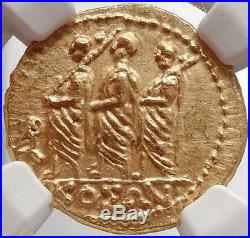
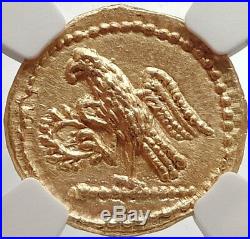
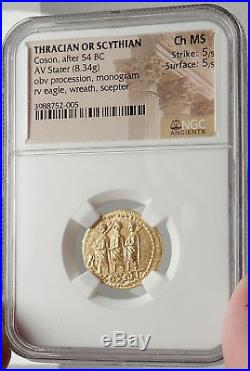



Authentic Ancient Coin of. Assassin of Julius Caesar. Gold Propaganda Coin with Obverse of his silver Coin from 54 B. With his famous ancestor L. Brutus Struck under: Dynast of Thrace: Koson Gold Stater 19mm (8.34 grams) Struck After 44 B. Reference: RPC 1701; BMC Thrace pg. 208, 2; BMCRR II pg. 474, 48 Certification: NGC Ancients. Ch MS Strike: 5/5 Surface: 5/5 3988752-005 KO , Roman consul accompanied by two lictors; BR monogram to left Eagle standing left on sceptre, holding wreath. Koson: Golden Ally of Brutus. Marcus Junius Brutus and C. Cassius Longinus left for Greece in August of 44 BC, having failed to win popular support at Rome following the assassination of Caesar. In the next two years the tyrannicides collected an immense war chest as they assembled their forces for the contest against Antony and Octavian. The historian Appian Bell. 75 tells us that L. Brutus struck from the treasures consigned to him by Polemocratia, the widow of the Thracian dynast Sadalas. Although the identity of the “Koson” named on the coins remains uncertain, the coinage in his name must be the coinage of L. Brutus described by Appian. The obverse depicts the great consul L. Junius Brutus, who expelled the Tarquins from Rome in 509 BC, accompanied by two lictors bearing axes. The design is copied from the denarius issued by M. Junius Brutus when he was a moneyer in 54 BC (Crawford 433/1). The reverse, an eagle standing on a sceptre and holding a victory wreath, was evidently a standard type at Rome and occurs on the coinage of Q. Pomponius Rufus (Crawford 398/1). The monogram is to be read as BR or LBR Brutus or L. The designs express Brutus’ propaganda in the civil war perfectly: the obverse represents the historic fight against tyranny, and the reverse represents the victorious Roman eagle. Lucius Junius Brutus was the founder of the Roman Republic and traditionally one of the first consuls in 509 BC. He was claimed as an ancestor of the Roman gens Junia, including Decimus Junius Brutus and Marcus Junius Brutus, the most famous of Julius Caesar’s assassins. Prior to the establishment of the Roman Republic, Rome had been ruled by kings. Brutus led the revolt that overthrew the last king, Lucius Tarquinius Superbus, after the rape of the noblewoman (and kinswoman of Brutus) Lucretia at the hands of Tarquin’s son Sextus Tarquinius. The account is from Livy’s Ab urbe condita and deals with a point in the history of Rome prior to reliable historical records (virtually all prior records were destroyed by the Gauls when they sacked Rome under Brennus in 390 BC or 387 BC). Overthrow of the Monarchy. Lucius Iunius Brutus, on right. Main article: Overthrow of the Roman monarchy. Brutus was the son of Tarquinia, daughter of Rome’s fifth king Lucius Tarquinius Priscus and sister to Rome’s seventh king Tarquinius Superbus. According to Livy, Brutus had a number of grievances against his uncle the king, amongst them was the fact that Tarquin had put to death a number of the chief men of Rome, including Brutus’ brother. Brutus avoided the distrust of Tarquin’s family by feigning slow-wittedness (in Latin brutus translates to dullard). He accompanied Tarquin’s sons on a trip to the Oracle of Delphi. The sons asked the oracle who would be the next ruler of Rome. The Oracle responded the next person to kiss his mother would become king. Brutus interpreted “mother” to mean the Earth, so he pretended to trip and kissed the ground. Brutus, along with Spurius Lucretius Tricipitinus, Publius Valerius Publicola, and Lucius Tarquinius Collatinus were summoned by Lucretia to Collatia after she had been raped by Sextus Tarquinius, the son of the king Tarquinius Superbus. Lucretia, believing that the rape dishonored her and her family, committed suicide by stabbing herself with a dagger after telling of what had befallen her. According to legend, Brutus grabbed the dagger from Lucretia’s breast after her death and immediately shouted for the overthrow of the Tarquins. The four men gathered the youth of Collatia, then went to Rome where Brutus, being at that time Tribunus Celerum , summoned the people to the forum and exhorted them to rise up against the king. The people voted for the deposition of the king, and the banishment of the royal family. Brutus, leaving Lucretius in command of the city, proceeded with armed men to the Roman army then camped at Ardea. The king, who had been with the army, heard of developments at Rome, and left the camp for the city before Brutus’ arrival. The army received Brutus as a hero, and the king’s sons were expelled from the camp. Tarquinius Superbus, meanwhile, was refused entry at Rome, and fled with his family into exile. The Oath of Brutus. According to Livy, Brutus’ first act after the expulsion of Lucius Tarquinius Superbus was to bring the people to swear an oath never to allow any man again to be king in Rome. Omnium primum avidum novae libertatis populum, ne postmodum flecti precibus aut donis regiis posset, iure iurando adegit neminem Romae passuros regnare. First of all, by swearing an oath that they would suffer no man to rule Rome, it forced the people, desirous of a new liberty, not to be thereafter swayed by the entreaties or bribes of kings. This is, fundamentally, a restatement of the’private oath’ sworn by the conspirators to overthrow the monarchy. Castissimum ante regiam iniuriam sanguinem iuro, vosque, di, testes facio me L. Tarquinium Superbum cum scelerata coniuge et omni liberorum stirpe ferro igni quacumque dehinc vi possim exsecuturum, nec illos nec alium quemquam regnare Romae passurum. There is no scholarly agreement that the oath took place; it is reported, although differently, by Plutarch (Poplicola , 2) and Appian B. Brutus and Lucretia’s bereaved husband, Lucius Tarquinius Collatinus, were elected as the first consuls of Rome (509 BC). However, Tarquinius was soon replaced by Publius Valerius Publicola. Brutus’ first acts during his consulship, according to Livy, included administering an oath to the people of Rome to never again accept a king in Rome (see above) and replenishing the number of senators to 300 from the principal men of the equites. During his consulship the royal family made an attempt to regain the throne, firstly by their ambassadors seeking to subvert a number of the leading Roman citizens in the Tarquinian conspiracy. Amongst the conspirators were two brothers of Brutus’ wife Vitellia, and Brutus’ two sons, Titus Junius Brutus and Tiberius Junius Brutus. The conspiracy was discovered and the consuls determined to punish the conspirators with death. Brutus gained respect for his stoicism in watching the execution of his own sons, even though he showed emotion during the punishment. Tarquin again sought to retake the throne soon after at the Battle of Silva Arsia, leading the forces of Tarquinii and Veii against the Roman army. Valerius led the infantry, and Brutus led the cavalry. Aruns, the king’s son, led the Etruscan cavalry. The cavalry first joined battle and Aruns, having spied from afar the lictors, and thereby recognizing the presence of a consul, soon saw that Brutus was in command of the cavalry. The two men, who were cousins, charged each other, and speared each other to death. The infantry also soon joined the battle, the result being in doubt for some time. The right wing of each army was victorious, the army of Tarquinii forcing back the Romans, and the Veientes being routed. However the Etruscan forces eventually fled the field, the Romans claiming the victory. The surviving consul, Valerius, after celebrating a triumph for the victory, held a funeral for Brutus with much magnificence. The Roman noblewomen mourned him for one year, for his vengeance of Lucretia’s violation. Brutus in literature and art. The Lictors Bring to Brutus the Bodies of His Sons by David, 1789. Lucius Junius Brutus is quite prominent in English literature, and he was quite popular among British and American Whigs. A reference to L. Brutus is in the following lines from Shakespeare’s play The Tragedie of Julius Cæsar , (Cassius to Marcus Brutus, Act 1, Scene 2). O, you and I have heard our fathers say, There was a Brutus once that would have brooktTh’eternal devil to keep his state in RomeAs easily as a king. One of the main charges of the senatorial faction that plotted against Julius Caesar after he had the Roman Senate declare him dictator for life, was that he was attempting to make himself a king, and a co-conspirator Cassius, enticed Brutus’ direct descendant, Marcus Junius Brutus, to join the conspiracy by referring to his ancestor. Brutus is a leading character in Shakespeare’s Rape of Lucrece and in Nathaniel Lee’s Restoration tragedy (1680), Lucius Junius Brutus; Father of his Country. In The Mikado , Nanki-poo refers to his father as “the Lucius Junius Brutus of his race”. The memory of L. Brutus also had a profound impact on Italian patriots, including those who established the ill-fated Roman Republic in February 1849. Brutus was a hero of republicanism during the Enlightenment and Neoclassical periods. In 1789, at the dawn of the French Revolution, master painter Jacques-Louis David publicly exhibited his politically charged masterwork, The Lictors Bring to Brutus the Bodies of His Sons , to great controversy. Marcus Junius Brutus (early June, 85 BC – late October, 42 BC), often referred to as Brutus , was a politician of the late Roman Republic. He is best known in modern times for taking a leading role in the assassination of Julius Caesar. Marcus Junius Brutus the Younger was the son of Marcus Junius Brutus the Elder and Servilia Caepionis. His father was killed by Pompey the Great in dubious circumstances after he had taken part in the rebellion of Lepidus; his mother was the half-sister of Cato the Younger, and later Julius Caesar’s mistress. Some sources refer to the possibility of Caesar being his real father, despite Caesar’s being only 15 years old when Brutus was born. Brutus’ uncle, Quintus Servilius Caepio, adopted him in about 59 BC, and Brutus was known officially for a time as Quintus Servilius Caepio Brutus before he reverted to using his birth-name. Following Caesar’s assassination in 44 BC, Brutus revived his adoptive name in order to illustrate his links to another famous tyrannicide, Gaius Servilius Ahala, from whom he was descended. Brutus held his uncle in high regard and his political career started when he became an assistant to Cato, during his governorship of Cyprus. From his first appearance in the Senate, Brutus aligned with the Optimates (the conservative faction) against the First Triumvirate of Marcus Licinius Crassus, Gnaeus Pompeius Magnus and Gaius Julius Caesar. When civil war broke out in 49 BC between Pompey and Caesar, Brutus followed his old enemy and present leader of the Optimates, Pompey. When the Battle of Pharsalus began, Caesar ordered his officers to take Brutus prisoner if he gave himself up voluntarily, and if he persisted in fighting against capture, to let him alone and do him no violence. After the disaster of the Battle of Pharsalus, Brutus wrote to Caesar with apologies and Caesar immediately forgave him. Caesar then accepted him into his inner circle and made him governor of Gaul when he left for Africa in pursuit of Cato and Metellus Scipio. In 45 BC, Caesar nominated Brutus to serve as urban praetor for the following year. Also, in June 45 BC, Brutus divorced his wife and married his first cousin, Porcia Catonis, Cato’s daughter. According to Cicero the marriage caused a semi-scandal as Brutus failed to state a valid reason for his divorce from Claudia other than he wished to marry Porcia. The marriage also caused a rift between Brutus and his mother, who resented the affection Brutus had for Porcia. Assassination of Julius Caesar (44 BC). Main article: Assassination of Julius Caesar. Death of Caesar by Vincenzo Camuccini. Around this time, many senators began to fear Caesar’s growing power following his appointment as dictator for life. Brutus was persuaded into joining the conspiracy against Caesar by the other senators. Eventually, Brutus decided to move against Caesar after Caesar’s king-like behavior prompted him to take action. His wife was the only woman privy to the plot. The conspirators planned to carry out their plot on the Ides of March (March 15) that same year. On that day, Caesar was delayed going to the Senate because his wife, Calpurnia Pisonis, tried to convince him not to go. The conspirators feared the plot had been found out. Brutus persisted, however, waiting for Caesar at the Senate, and allegedly still chose to remain even when a messenger brought him news that would otherwise have caused him to leave. When Caesar finally did come to the Senate, they attacked him. Publius Servilius Casca Longus was allegedly the first to attack Caesar with a blow to the shoulder, which Caesar blocked. However, upon seeing Brutus was with the conspirators, he covered his face with his toga and resigned himself to his fate. The conspirators attacked in such numbers that they even wounded one another. Brutus is said to have been wounded in the hand and in the legs. After the assassination, the Senate passed an amnesty on the assassins. This amnesty was proposed by Caesar’s friend and co-consul Marcus Antonius. Nonetheless, uproar among the population caused Brutus and the conspirators to leave Rome. Brutus settled in Crete from 44 to 42 BC. In 43 BC, after Octavian received his consulship from the Roman Senate, one of his first actions was to have the people that had assassinated Julius Caesar declared murderers and enemies of the state. Marcus Tullius Cicero, angry at Octavian, wrote a letter to Brutus explaining that the forces of Octavian and Marcus Antonius were divided. Antonius had laid siege to the province of Gaul, where he wanted a governorship. In response to this siege, Octavian rallied his troops and fought a series of battles in which Antonius was defeated. Battle of Philippi (42 BC). Upon hearing that neither Antonius nor Octavian had an army big enough to defend Rome, Brutus rallied his troops, which totaled about 17 legions. When Octavian heard that Brutus was on his way to Rome, he made peace with Antonius. Their armies, which together totaled about 19 legions, marched to meet Brutus and Gaius Cassius Longinus. The two sides met in two engagements known as the Battle of Philippi. The first was fought on October 3, 42 BC, in which Brutus defeated Octavian’s forces, although Cassius was defeated by Antonius’ forces. The second engagement was fought on October 23, 42 BC and ended in Brutus’ defeat. After the defeat, he fled into the nearby hills with only about four legions. Knowing his army had been defeated and that he would be captured, Brutus committed suicide. Among his last words were, according to Plutarch, By all means must we fly; not with our feet, however, but with our hands. Brutus also uttered the well-known verse calling down a curse upon Antonius (Plutarch repeats this from the memoirs of Publius Volumnius): Forget not, Zeus, the author of these crimes (in the Dryden translation this passage is given as Punish, great Jove, the author of these ills). Plutarch wrote that, according to Volumnius, Brutus repeated two verses, but Volumnius was only able to recall the one quoted. Antonius, as a show of great respect, ordered Brutus’ body to be wrapped in Antonius’ most expensive purple mantle (this was later stolen and Antonius had the thief executed). Brutus was cremated, and his ashes were sent to his mother, Servilia Caepionis. His wife Porcia was reported to have committed suicide upon hearing of her husband’s death, although, according to Plutarch (Brutus 53 para 2), there is some dispute as to whether this is the case: Plutarch states that there is a letter in existence that was allegedly written by Brutus mourning the manner of her death. 85 BC: Brutus was born in Rome to Marcus Junius Brutus The Elder and Servilia Caepionis. 58 BC: He was made assistant to Cato, governor of Cyprus which helped him start his political career. 53 BC: He was given the quaestorship in Cilicia. 49 BC: Brutus followed Pompey to Greece during the civil war against Caesar. 48 BC: Brutus was pardoned by Caesar. 46 BC: He was made governor of Gaul. 45 BC: He was made Praetor. 44 BC: Murdered Caesar with other liberatores; went to Athens and then to Crete. 42 BC: Battle with Marcus Antonius’s forces. This was the noblest Roman of them all: All the conspirators save only he Did that they did in envy of great Caesar; He only, in a general honest thought And common good to all, made one of them. His life was gentle, and the elements So mix’d in him that Nature might stand up And say to all the world This was a man! William Shakespeare, Julius Caesar , Act 5, Scene 5 (Mark Antony). The phrase Sic semper tyrannis! Thus, ever (or always), to tyrants! Is attributed to Brutus at Caesar’s assassination. The phrase is also the official motto of the Commonwealth of Virginia. John Wilkes Booth, the assassin of Abraham Lincoln, claimed to be inspired by Brutus. Booth’s father, Junius Brutus Booth, was named for Brutus, and Booth (as Marcus Antonius) and his brother (as Brutus) had performed in a production of Julius Caesar in New York just six months before the assassination. On the night of the assassination, Booth is alleged to have shouted “Sic semper tyrannis” while leaping to the stage of Ford’s Theater. And why; For doing what Brutus was honored for… Booth was also known to be greatly attracted to Caesar himself, having played both Brutus and Caesar upon various stages. The well-known phrase Et tu, Brute? Is famous as Caesar’s utterance in the play Julius Caesar, although it is not his last words, and the sources describing Caesar’s death disagree about what his last words were. In Dante’s Inferno , Brutus is one of three people deemed sinful enough to be chewed in one of the three mouths of Satan, in the very center of Hell, for all eternity. The other two are Cassius, who was Brutus’s fellow conspirator and Judas Iscariot (Canto XXXIV). Dante condemned these three in the afterlife for being Treacherous Against Their Masters and enemies of the King/Emperor. Shakespeare’s play Julius Caesar depicts Caesar’s assassination by Brutus and his accomplices, and the murderers’ subsequent downfall. In the final scene, Marcus Antonius describes Brutus as “the noblest Roman of them all”, for he was the only conspirator who acted for the good of Rome. In the Masters of Rome novels of Colleen McCullough, Brutus is portrayed as a timid intellectual who hates Caesar for personal reasons, foremost of them the fact that his marriage arrangement with Caesar’s daughter, Julia, whom Brutus deeply loved, was dissolved in Caesar’s political gamble to give his daughter’s hand to Pompey to cement with him an alliance. Cassius and Trebonius use him as a figurehead because of his family connections, and his descendence from the founder of the Republic. He appears in Fortune’s Favourites , Caesar’s Women , Caesar and The October Horse. Ides of March is an epistolatory novel by Thornton Wilder dealing with characters and events leading to, and culminating in, the assassination of Julius Caesar. In the TV series Rome , Brutus, portrayed by Tobias Menzies, is depicted as a young man torn between what he believes is right, and his loyalty and love of a man who has been like a father to him. In the series, his personality and motives are accurate but Brutus’ relationship to Cassius and Cato is not mentioned, and his three sisters and wife Porcia are omitted from the series completely. Brutus is an occasional supporting character in Asterix comics, most notably Asterix and Son in which he is the main antagonist. The character appears in the live Asterix film adaptations – though briefly in the first two – Asterix and Obelix vs Caesar (played by Didier Cauchy) and Asterix at the Olympic Games. In the latter film, he is portrayed as a comical villain by Belgian actor Benoît Poelvoorde: he is a central character to the film, even though he was not depicted in the original Asterix at the Olympic Games comic book. Following sources cited in Plutarch, he is implied in that film to be Julius Caesar’s biological son. The Hives’ song “B is for Brutus” contains titular and lyrical references to Junius Brutus. The Roman Republic was the phase of the ancient Roman civilization characterized by a republican form of government. It began with the overthrow of the Roman monarchy, c. 509 BC, and lasted over 450 years until its subversion, through a series of civil wars, into the Principate form of government and the Imperial period. The Roman Republic was governed by a complex constitution, which centered on the principles of a separation of powers and checks and balances. The evolution of the constitution was heavily influenced by the struggle between the aristocracy (the patricians), and other talented Romans who were not from famous families, the plebeians. Early in its history, the republic was controlled by an aristocracy of individuals who could trace their ancestry back to the early history of the kingdom. Over time, the laws that allowed these individuals to dominate the government were repealed, and the result was the emergence of a new aristocracy which depended on the structure of society, rather than the law, to maintain its dominance. During the first two centuries, the Republic saw its territory expand from central Italy to the entire Mediterranean world. In the next century, Rome grew to dominate North Africa, the Iberian Peninsula, Greece, and what is now southern France. During the last two centuries of the Roman Republic, it grew to dominate the rest of modern France, as well as much of the east. At this point, the republican political machinery was replaced with imperialism. The precise event which signaled the end of the Roman Republic and the transition into the Roman Empire is a matter of interpretation. Towards the end of the period a selection of Roman leaders came to so dominate the political arena that they exceeded the limitations of the Republic as a matter of course. Historians have variously proposed the appointment of Julius Caesar as perpetual dictator in 44 BC, the defeat of Mark Antony at the Battle of Actium in 31 BC, and the Roman Senate’s grant of extraordinary powers to Octavian (Augustus) under the first settlement in 27 BC, as candidates for the defining pivotal event ending the Republic. Many of Rome’s legal and legislative structures can still be observed throughout Europe and the rest of the world by modern nation state and international organizations. The Romans’ Latin language has influenced grammar and vocabulary across parts of Europe and the world. World-renowned expert numismatist, enthusiast, author and dealer in authentic ancient Greek, ancient Roman, ancient Byzantine, world coins & more. Ilya Zlobin is an independent individual who has a passion for coin collecting, research and understanding the importance of the historical context and significance all coins and objects represent. Send me a message about this and I can update your invoice should you want this method. Getting your order to you, quickly and securely is a top priority and is taken seriously here. Great care is taken in packaging and mailing every item securely and quickly. What is a certificate of authenticity and what guarantees do you give that the item is authentic? You will be very happy with what you get with the COA; a professional presentation of the coin, with all of the relevant information and a picture of the coin you saw in the listing. Additionally, the coin is inside it’s own protective coin flip (holder), with a 2×2 inch description of the coin matching the individual number on the COA. Whether your goal is to collect or give the item as a gift, coins presented like this could be more prized and valued higher than items that were not given such care and attention to. When should I leave feedback? Please don’t leave any negative feedbacks, as it happens sometimes that people rush to leave feedback before letting sufficient time for their order to arrive. The matter of fact is that any issues can be resolved, as reputation is most important to me. My goal is to provide superior products and quality of service. How and where do I learn more about collecting ancient coins? Visit the Guide on How to Use My Store. For on an overview about using my store, with additional information and links to all other parts of my store which may include educational information on topics you are looking for. The item “Brutus Julius Caesar Roman Assassin 44BC Ancient Greek GOLD Coin NGC MS i66667″ is in sale since Wednesday, August 8, 2018. This item is in the category “Coins & Paper Money\Coins\ Ancient\Greek (450 BC-100 AD)”. The seller is “highrating_lowprice” and is located in Rego Park, New York. This item can be shipped worldwide.
- Coin Type: Ancient
- Modified Item: No
- Certification Number: 3988752-005
- Certification: NGC
- Grade: Ch MS
- Composition: Gold
- Culture: Greek

ACHAEMENID EMPIRE Sardes Lydia 485BC Gold Daric Ancient Greek Coin NGC AU i70330
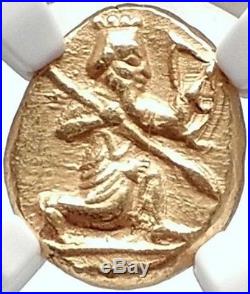
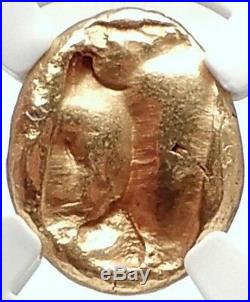
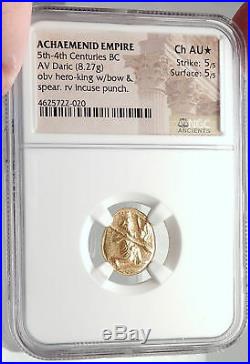



Item: i70330 Authentic Ancient Coin of. Greek coin of Lydia. Under the Achaemenid Empire. Time of Darius I to Xerxes II 485-420 B. Gold Daric 16mm (8.27 grams) Struck circa 485-420 B. Reference: Carradice Type IIIb, Group B Certification: NGC Ancients. Ch AU Strike: 5/5 Surface: 5/5 4625722-020 Achaemenid king or hero, wearing cidaris and candys, quiver over shoulder, in kneeling-running stance right, transverse spear with globular terminal in right hand, bow forward in left. Irregular rectangular incuse punch with rough interior surface. Successors of Darius I, continued in the traditions established by that monarch, issuing gold darics and silver sigloi for circulation in western Anatolia. The Lydian capital of Sardes, the center of Achaemenid power in the area, was undoubtedly the principal mint, though other cities may have assisted in the production of this enormous coinage. The kneeling archer, with oblong punch on reverse, remained the sole type for this Persian imperial coinage down to Alexander’s conquest in 330 B. The Achaemenid Empire c. 550-330 BC, was an empire based in Western Asia, founded by Cyrus the Great, notable for embracing various civilizations and becoming the largest empire of ancient history, spanning at its maximum extent from the Balkans and Eastern Europe proper in the west, to the Indus Valley in the east. It is equally notable for its successful model of a centralised, bureaucratic administration (through satraps under a king) and a government working to the profit of its subjects, for building infrastructure such as a postal system and road systems and the use of an official language across its territories and a large professional army and civil services (inspiring similar systems in later empires), and for emancipation of slaves including the Jewish exiles in Babylon, and is noted in Western history as the antagonist of the Greek city states during the Greco-Persian Wars. The Mausoleum at Halicarnassus, one of the Seven Wonders of the Ancient World, was built in the empire as well. World-renowned expert numismatist, enthusiast, author and dealer in authentic ancient Greek, ancient Roman, ancient Byzantine, world coins & more. Ilya Zlobin is an independent individual who has a passion for coin collecting, research and understanding the importance of the historical context and significance all coins and objects represent. Send me a message about this and I can update your invoice should you want this method. Getting your order to you, quickly and securely is a top priority and is taken seriously here. Great care is taken in packaging and mailing every item securely and quickly. What is a certificate of authenticity and what guarantees do you give that the item is authentic? You will be very happy with what you get with the COA; a professional presentation of the coin, with all of the relevant information and a picture of the coin you saw in the listing. Additionally, the coin is inside it’s own protective coin flip (holder), with a 2×2 inch description of the coin matching the individual number on the COA. Whether your goal is to collect or give the item as a gift, coins presented like this could be more prized and valued higher than items that were not given such care and attention to. When should I leave feedback? Please don’t leave any negative feedbacks, as it happens sometimes that people rush to leave feedback before letting sufficient time for their order to arrive. The matter of fact is that any issues can be resolved, as reputation is most important to me. My goal is to provide superior products and quality of service. How and where do I learn more about collecting ancient coins? Visit the Guide on How to Use My Store. For on an overview about using my store, with additional information and links to all other parts of my store which may include educational information on topics you are looking for. The item “ACHAEMENID EMPIRE Sardes Lydia 485BC Gold Daric Ancient Greek Coin NGC AU i70330″ is in sale since Thursday, December 6, 2018. This item is in the category “Coins & Paper Money\Coins\ Ancient\Greek (450 BC-100 AD)”. The seller is “highrating_lowprice” and is located in Rego Park, New York. This item can be shipped worldwide.
- Certification Number: 4625722-020
- Certification: NGC
- Grade: Ch AU*
- Composition: Gold
- Denomination: Daric

Brutus Julius Caesar Roman Assassin 44BC Ancient Greek GOLD Coin NGC MS i68143
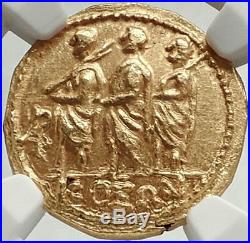
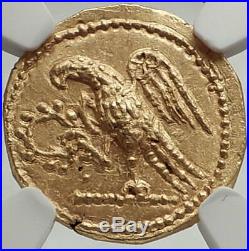
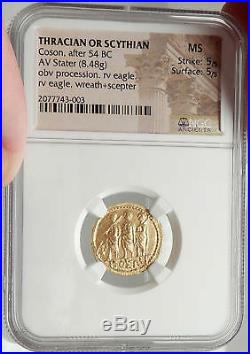
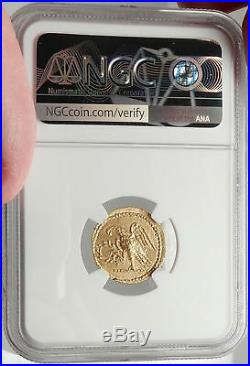
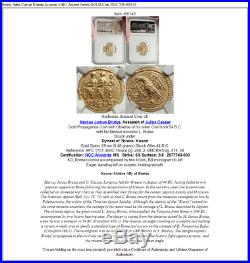

Authentic Ancient Coin of. Assassin of Julius Caesar. Gold Propaganda Coin with Obverse of his silver Coin from 54 B. With his famous ancestor L. Brutus Struck under: Dynast of Thrace: Koson Gold Stater 17mm (8.48 grams) Struck After 44 B. Reference: RPC 1701; BMC Thrace pg. 208, 2; BMCRR II pg. 474, 48 Certification: NGC Ancients. MS Strike: 5/5 Surface: 5/5 2077743-003 KO , Roman consul accompanied by two lictors; BR monogram to left Eagle standing left on sceptre, holding wreath. Koson: Golden Ally of Brutus. Marcus Junius Brutus and C. Cassius Longinus left for Greece in August of 44 BC, having failed to win popular support at Rome following the assassination of Caesar. In the next two years the tyrannicides collected an immense war chest as they assembled their forces for the contest against Antony and Octavian. The historian Appian Bell. 75 tells us that L. Brutus struck from the treasures consigned to him by Polemocratia, the widow of the Thracian dynast Sadalas. Although the identity of the “Koson” named on the coins remains uncertain, the coinage in his name must be the coinage of L. Brutus described by Appian. The obverse depicts the great consul L. Junius Brutus, who expelled the Tarquins from Rome in 509 BC, accompanied by two lictors bearing axes. The design is copied from the denarius issued by M. Junius Brutus when he was a moneyer in 54 BC (Crawford 433/1). The reverse, an eagle standing on a sceptre and holding a victory wreath, was evidently a standard type at Rome and occurs on the coinage of Q. Pomponius Rufus (Crawford 398/1). The monogram is to be read as BR or LBR Brutus or L. The designs express Brutus’ propaganda in the civil war perfectly: the obverse represents the historic fight against tyranny, and the reverse represents the victorious Roman eagle. Lucius Junius Brutus was the founder of the Roman Republic and traditionally one of the first consuls in 509 BC. He was claimed as an ancestor of the Roman gens Junia, including Decimus Junius Brutus and Marcus Junius Brutus, the most famous of Julius Caesar’s assassins. Prior to the establishment of the Roman Republic, Rome had been ruled by kings. Brutus led the revolt that overthrew the last king, Lucius Tarquinius Superbus, after the rape of the noblewoman (and kinswoman of Brutus) Lucretia at the hands of Tarquin’s son Sextus Tarquinius. The account is from Livy’s Ab urbe condita and deals with a point in the history of Rome prior to reliable historical records (virtually all prior records were destroyed by the Gauls when they sacked Rome under Brennus in 390 BC or 387 BC). Overthrow of the Monarchy. Lucius Iunius Brutus, on right. Main article: Overthrow of the Roman monarchy. Brutus was the son of Tarquinia, daughter of Rome’s fifth king Lucius Tarquinius Priscus and sister to Rome’s seventh king Tarquinius Superbus. According to Livy, Brutus had a number of grievances against his uncle the king, amongst them was the fact that Tarquin had put to death a number of the chief men of Rome, including Brutus’ brother. Brutus avoided the distrust of Tarquin’s family by feigning slow-wittedness (in Latin brutus translates to dullard). He accompanied Tarquin’s sons on a trip to the Oracle of Delphi. The sons asked the oracle who would be the next ruler of Rome. The Oracle responded the next person to kiss his mother would become king. Brutus interpreted “mother” to mean the Earth, so he pretended to trip and kissed the ground. Brutus, along with Spurius Lucretius Tricipitinus, Publius Valerius Publicola, and Lucius Tarquinius Collatinus were summoned by Lucretia to Collatia after she had been raped by Sextus Tarquinius, the son of the king Tarquinius Superbus. Lucretia, believing that the rape dishonored her and her family, committed suicide by stabbing herself with a dagger after telling of what had befallen her. According to legend, Brutus grabbed the dagger from Lucretia’s breast after her death and immediately shouted for the overthrow of the Tarquins. The four men gathered the youth of Collatia, then went to Rome where Brutus, being at that time Tribunus Celerum , summoned the people to the forum and exhorted them to rise up against the king. The people voted for the deposition of the king, and the banishment of the royal family. Brutus, leaving Lucretius in command of the city, proceeded with armed men to the Roman army then camped at Ardea. The king, who had been with the army, heard of developments at Rome, and left the camp for the city before Brutus’ arrival. The army received Brutus as a hero, and the king’s sons were expelled from the camp. Tarquinius Superbus, meanwhile, was refused entry at Rome, and fled with his family into exile. The Oath of Brutus. According to Livy, Brutus’ first act after the expulsion of Lucius Tarquinius Superbus was to bring the people to swear an oath never to allow any man again to be king in Rome. Omnium primum avidum novae libertatis populum, ne postmodum flecti precibus aut donis regiis posset, iure iurando adegit neminem Romae passuros regnare. First of all, by swearing an oath that they would suffer no man to rule Rome, it forced the people, desirous of a new liberty, not to be thereafter swayed by the entreaties or bribes of kings. This is, fundamentally, a restatement of the’private oath’ sworn by the conspirators to overthrow the monarchy. Castissimum ante regiam iniuriam sanguinem iuro, vosque, di, testes facio me L. Tarquinium Superbum cum scelerata coniuge et omni liberorum stirpe ferro igni quacumque dehinc vi possim exsecuturum, nec illos nec alium quemquam regnare Romae passurum. There is no scholarly agreement that the oath took place; it is reported, although differently, by Plutarch (Poplicola , 2) and Appian B. Brutus and Lucretia’s bereaved husband, Lucius Tarquinius Collatinus, were elected as the first consuls of Rome (509 BC). However, Tarquinius was soon replaced by Publius Valerius Publicola. Brutus’ first acts during his consulship, according to Livy, included administering an oath to the people of Rome to never again accept a king in Rome (see above) and replenishing the number of senators to 300 from the principal men of the equites. During his consulship the royal family made an attempt to regain the throne, firstly by their ambassadors seeking to subvert a number of the leading Roman citizens in the Tarquinian conspiracy. Amongst the conspirators were two brothers of Brutus’ wife Vitellia, and Brutus’ two sons, Titus Junius Brutus and Tiberius Junius Brutus. The conspiracy was discovered and the consuls determined to punish the conspirators with death. Brutus gained respect for his stoicism in watching the execution of his own sons, even though he showed emotion during the punishment. Tarquin again sought to retake the throne soon after at the Battle of Silva Arsia, leading the forces of Tarquinii and Veii against the Roman army. Valerius led the infantry, and Brutus led the cavalry. Aruns, the king’s son, led the Etruscan cavalry. The cavalry first joined battle and Aruns, having spied from afar the lictors, and thereby recognizing the presence of a consul, soon saw that Brutus was in command of the cavalry. The two men, who were cousins, charged each other, and speared each other to death. The infantry also soon joined the battle, the result being in doubt for some time. The right wing of each army was victorious, the army of Tarquinii forcing back the Romans, and the Veientes being routed. However the Etruscan forces eventually fled the field, the Romans claiming the victory. The surviving consul, Valerius, after celebrating a triumph for the victory, held a funeral for Brutus with much magnificence. The Roman noblewomen mourned him for one year, for his vengeance of Lucretia’s violation. Brutus in literature and art. The Lictors Bring to Brutus the Bodies of His Sons by David, 1789. Lucius Junius Brutus is quite prominent in English literature, and he was quite popular among British and American Whigs. A reference to L. Brutus is in the following lines from Shakespeare’s play The Tragedie of Julius Cæsar , (Cassius to Marcus Brutus, Act 1, Scene 2). O, you and I have heard our fathers say, There was a Brutus once that would have brooktTh’eternal devil to keep his state in RomeAs easily as a king. One of the main charges of the senatorial faction that plotted against Julius Caesar after he had the Roman Senate declare him dictator for life, was that he was attempting to make himself a king, and a co-conspirator Cassius, enticed Brutus’ direct descendant, Marcus Junius Brutus, to join the conspiracy by referring to his ancestor. Brutus is a leading character in Shakespeare’s Rape of Lucrece and in Nathaniel Lee’s Restoration tragedy (1680), Lucius Junius Brutus; Father of his Country. In The Mikado , Nanki-poo refers to his father as “the Lucius Junius Brutus of his race”. The memory of L. Brutus also had a profound impact on Italian patriots, including those who established the ill-fated Roman Republic in February 1849. Brutus was a hero of republicanism during the Enlightenment and Neoclassical periods. In 1789, at the dawn of the French Revolution, master painter Jacques-Louis David publicly exhibited his politically charged masterwork, The Lictors Bring to Brutus the Bodies of His Sons , to great controversy. Marcus Junius Brutus (early June, 85 BC – late October, 42 BC), often referred to as Brutus , was a politician of the late Roman Republic. He is best known in modern times for taking a leading role in the assassination of Julius Caesar. Marcus Junius Brutus the Younger was the son of Marcus Junius Brutus the Elder and Servilia Caepionis. His father was killed by Pompey the Great in dubious circumstances after he had taken part in the rebellion of Lepidus; his mother was the half-sister of Cato the Younger, and later Julius Caesar’s mistress. Some sources refer to the possibility of Caesar being his real father, despite Caesar’s being only 15 years old when Brutus was born. Brutus’ uncle, Quintus Servilius Caepio, adopted him in about 59 BC, and Brutus was known officially for a time as Quintus Servilius Caepio Brutus before he reverted to using his birth-name. Following Caesar’s assassination in 44 BC, Brutus revived his adoptive name in order to illustrate his links to another famous tyrannicide, Gaius Servilius Ahala, from whom he was descended. Brutus held his uncle in high regard and his political career started when he became an assistant to Cato, during his governorship of Cyprus. From his first appearance in the Senate, Brutus aligned with the Optimates (the conservative faction) against the First Triumvirate of Marcus Licinius Crassus, Gnaeus Pompeius Magnus and Gaius Julius Caesar. When civil war broke out in 49 BC between Pompey and Caesar, Brutus followed his old enemy and present leader of the Optimates, Pompey. When the Battle of Pharsalus began, Caesar ordered his officers to take Brutus prisoner if he gave himself up voluntarily, and if he persisted in fighting against capture, to let him alone and do him no violence. After the disaster of the Battle of Pharsalus, Brutus wrote to Caesar with apologies and Caesar immediately forgave him. Caesar then accepted him into his inner circle and made him governor of Gaul when he left for Africa in pursuit of Cato and Metellus Scipio. In 45 BC, Caesar nominated Brutus to serve as urban praetor for the following year. Also, in June 45 BC, Brutus divorced his wife and married his first cousin, Porcia Catonis, Cato’s daughter. According to Cicero the marriage caused a semi-scandal as Brutus failed to state a valid reason for his divorce from Claudia other than he wished to marry Porcia. The marriage also caused a rift between Brutus and his mother, who resented the affection Brutus had for Porcia. Assassination of Julius Caesar (44 BC). Main article: Assassination of Julius Caesar. Death of Caesar by Vincenzo Camuccini. Around this time, many senators began to fear Caesar’s growing power following his appointment as dictator for life. Brutus was persuaded into joining the conspiracy against Caesar by the other senators. Eventually, Brutus decided to move against Caesar after Caesar’s king-like behavior prompted him to take action. His wife was the only woman privy to the plot. The conspirators planned to carry out their plot on the Ides of March (March 15) that same year. On that day, Caesar was delayed going to the Senate because his wife, Calpurnia Pisonis, tried to convince him not to go. The conspirators feared the plot had been found out. Brutus persisted, however, waiting for Caesar at the Senate, and allegedly still chose to remain even when a messenger brought him news that would otherwise have caused him to leave. When Caesar finally did come to the Senate, they attacked him. Publius Servilius Casca Longus was allegedly the first to attack Caesar with a blow to the shoulder, which Caesar blocked. However, upon seeing Brutus was with the conspirators, he covered his face with his toga and resigned himself to his fate. The conspirators attacked in such numbers that they even wounded one another. Brutus is said to have been wounded in the hand and in the legs. After the assassination, the Senate passed an amnesty on the assassins. This amnesty was proposed by Caesar’s friend and co-consul Marcus Antonius. Nonetheless, uproar among the population caused Brutus and the conspirators to leave Rome. Brutus settled in Crete from 44 to 42 BC. In 43 BC, after Octavian received his consulship from the Roman Senate, one of his first actions was to have the people that had assassinated Julius Caesar declared murderers and enemies of the state. Marcus Tullius Cicero, angry at Octavian, wrote a letter to Brutus explaining that the forces of Octavian and Marcus Antonius were divided. Antonius had laid siege to the province of Gaul, where he wanted a governorship. In response to this siege, Octavian rallied his troops and fought a series of battles in which Antonius was defeated. Battle of Philippi (42 BC). Upon hearing that neither Antonius nor Octavian had an army big enough to defend Rome, Brutus rallied his troops, which totaled about 17 legions. When Octavian heard that Brutus was on his way to Rome, he made peace with Antonius. Their armies, which together totaled about 19 legions, marched to meet Brutus and Gaius Cassius Longinus. The two sides met in two engagements known as the Battle of Philippi. The first was fought on October 3, 42 BC, in which Brutus defeated Octavian’s forces, although Cassius was defeated by Antonius’ forces. The second engagement was fought on October 23, 42 BC and ended in Brutus’ defeat. After the defeat, he fled into the nearby hills with only about four legions. Knowing his army had been defeated and that he would be captured, Brutus committed suicide. Among his last words were, according to Plutarch, By all means must we fly; not with our feet, however, but with our hands. Brutus also uttered the well-known verse calling down a curse upon Antonius (Plutarch repeats this from the memoirs of Publius Volumnius): Forget not, Zeus, the author of these crimes (in the Dryden translation this passage is given as Punish, great Jove, the author of these ills). Plutarch wrote that, according to Volumnius, Brutus repeated two verses, but Volumnius was only able to recall the one quoted. Antonius, as a show of great respect, ordered Brutus’ body to be wrapped in Antonius’ most expensive purple mantle (this was later stolen and Antonius had the thief executed). Brutus was cremated, and his ashes were sent to his mother, Servilia Caepionis. His wife Porcia was reported to have committed suicide upon hearing of her husband’s death, although, according to Plutarch (Brutus 53 para 2), there is some dispute as to whether this is the case: Plutarch states that there is a letter in existence that was allegedly written by Brutus mourning the manner of her death. 85 BC: Brutus was born in Rome to Marcus Junius Brutus The Elder and Servilia Caepionis. 58 BC: He was made assistant to Cato, governor of Cyprus which helped him start his political career. 53 BC: He was given the quaestorship in Cilicia. 49 BC: Brutus followed Pompey to Greece during the civil war against Caesar. 48 BC: Brutus was pardoned by Caesar. 46 BC: He was made governor of Gaul. 45 BC: He was made Praetor. 44 BC: Murdered Caesar with other liberatores; went to Athens and then to Crete. 42 BC: Battle with Marcus Antonius’s forces. This was the noblest Roman of them all: All the conspirators save only he Did that they did in envy of great Caesar; He only, in a general honest thought And common good to all, made one of them. His life was gentle, and the elements So mix’d in him that Nature might stand up And say to all the world This was a man! William Shakespeare, Julius Caesar , Act 5, Scene 5 (Mark Antony). The phrase Sic semper tyrannis! Thus, ever (or always), to tyrants! Is attributed to Brutus at Caesar’s assassination. The phrase is also the official motto of the Commonwealth of Virginia. John Wilkes Booth, the assassin of Abraham Lincoln, claimed to be inspired by Brutus. Booth’s father, Junius Brutus Booth, was named for Brutus, and Booth (as Marcus Antonius) and his brother (as Brutus) had performed in a production of Julius Caesar in New York just six months before the assassination. On the night of the assassination, Booth is alleged to have shouted “Sic semper tyrannis” while leaping to the stage of Ford’s Theater. And why; For doing what Brutus was honored for… Booth was also known to be greatly attracted to Caesar himself, having played both Brutus and Caesar upon various stages. The well-known phrase Et tu, Brute? Is famous as Caesar’s utterance in the play Julius Caesar, although it is not his last words, and the sources describing Caesar’s death disagree about what his last words were. In Dante’s Inferno , Brutus is one of three people deemed sinful enough to be chewed in one of the three mouths of Satan, in the very center of Hell, for all eternity. The other two are Cassius, who was Brutus’s fellow conspirator and Judas Iscariot (Canto XXXIV). Dante condemned these three in the afterlife for being Treacherous Against Their Masters and enemies of the King/Emperor. Shakespeare’s play Julius Caesar depicts Caesar’s assassination by Brutus and his accomplices, and the murderers’ subsequent downfall. In the final scene, Marcus Antonius describes Brutus as “the noblest Roman of them all”, for he was the only conspirator who acted for the good of Rome. In the Masters of Rome novels of Colleen McCullough, Brutus is portrayed as a timid intellectual who hates Caesar for personal reasons, foremost of them the fact that his marriage arrangement with Caesar’s daughter, Julia, whom Brutus deeply loved, was dissolved in Caesar’s political gamble to give his daughter’s hand to Pompey to cement with him an alliance. Cassius and Trebonius use him as a figurehead because of his family connections, and his descendence from the founder of the Republic. He appears in Fortune’s Favourites , Caesar’s Women , Caesar and The October Horse. Ides of March is an epistolatory novel by Thornton Wilder dealing with characters and events leading to, and culminating in, the assassination of Julius Caesar. In the TV series Rome , Brutus, portrayed by Tobias Menzies, is depicted as a young man torn between what he believes is right, and his loyalty and love of a man who has been like a father to him. In the series, his personality and motives are accurate but Brutus’ relationship to Cassius and Cato is not mentioned, and his three sisters and wife Porcia are omitted from the series completely. Brutus is an occasional supporting character in Asterix comics, most notably Asterix and Son in which he is the main antagonist. The character appears in the live Asterix film adaptations – though briefly in the first two – Asterix and Obelix vs Caesar (played by Didier Cauchy) and Asterix at the Olympic Games. In the latter film, he is portrayed as a comical villain by Belgian actor Benoît Poelvoorde: he is a central character to the film, even though he was not depicted in the original Asterix at the Olympic Games comic book. Following sources cited in Plutarch, he is implied in that film to be Julius Caesar’s biological son. The Hives’ song “B is for Brutus” contains titular and lyrical references to Junius Brutus. The Roman Republic was the phase of the ancient Roman civilization characterized by a republican form of government. It began with the overthrow of the Roman monarchy, c. 509 BC, and lasted over 450 years until its subversion, through a series of civil wars, into the Principate form of government and the Imperial period. The Roman Republic was governed by a complex constitution, which centered on the principles of a separation of powers and checks and balances. The evolution of the constitution was heavily influenced by the struggle between the aristocracy (the patricians), and other talented Romans who were not from famous families, the plebeians. Early in its history, the republic was controlled by an aristocracy of individuals who could trace their ancestry back to the early history of the kingdom. Over time, the laws that allowed these individuals to dominate the government were repealed, and the result was the emergence of a new aristocracy which depended on the structure of society, rather than the law, to maintain its dominance. During the first two centuries, the Republic saw its territory expand from central Italy to the entire Mediterranean world. In the next century, Rome grew to dominate North Africa, the Iberian Peninsula, Greece, and what is now southern France. During the last two centuries of the Roman Republic, it grew to dominate the rest of modern France, as well as much of the east. At this point, the republican political machinery was replaced with imperialism. The precise event which signaled the end of the Roman Republic and the transition into the Roman Empire is a matter of interpretation. Towards the end of the period a selection of Roman leaders came to so dominate the political arena that they exceeded the limitations of the Republic as a matter of course. Historians have variously proposed the appointment of Julius Caesar as perpetual dictator in 44 BC, the defeat of Mark Antony at the Battle of Actium in 31 BC, and the Roman Senate’s grant of extraordinary powers to Octavian (Augustus) under the first settlement in 27 BC, as candidates for the defining pivotal event ending the Republic. Many of Rome’s legal and legislative structures can still be observed throughout Europe and the rest of the world by modern nation state and international organizations. The Romans’ Latin language has influenced grammar and vocabulary across parts of Europe and the world. World-renowned expert numismatist, enthusiast, author and dealer in authentic ancient Greek, ancient Roman, ancient Byzantine, world coins & more. Ilya Zlobin is an independent individual who has a passion for coin collecting, research and understanding the importance of the historical context and significance all coins and objects represent. Send me a message about this and I can update your invoice should you want this method. Getting your order to you, quickly and securely is a top priority and is taken seriously here. Great care is taken in packaging and mailing every item securely and quickly. What is a certificate of authenticity and what guarantees do you give that the item is authentic? You will be very happy with what you get with the COA; a professional presentation of the coin, with all of the relevant information and a picture of the coin you saw in the listing. Additionally, the coin is inside it’s own protective coin flip (holder), with a 2×2 inch description of the coin matching the individual number on the COA. Whether your goal is to collect or give the item as a gift, coins presented like this could be more prized and valued higher than items that were not given such care and attention to. When should I leave feedback? Please don’t leave any negative feedbacks, as it happens sometimes that people rush to leave feedback before letting sufficient time for their order to arrive. The matter of fact is that any issues can be resolved, as reputation is most important to me. My goal is to provide superior products and quality of service. How and where do I learn more about collecting ancient coins? Visit the Guide on How to Use My Store. For on an overview about using my store, with additional information and links to all other parts of my store which may include educational information on topics you are looking for. The item “Brutus Julius Caesar Roman Assassin 44BC Ancient Greek GOLD Coin NGC MS i68143″ is in sale since Wednesday, September 5, 2018. This item is in the category “Coins & Paper Money\Coins\ Ancient\Greek (450 BC-100 AD)”. The seller is “highrating_lowprice” and is located in Rego Park, New York. This item can be shipped worldwide.
- Coin Type: Ancient
- Certification Number: 2077743-003
- Certification: NGC
- Grade: MS
- Composition: Gold
- Culture: Greek

Brutus Julius Caesar Roman Assassin 44BC Ancient Greek GOLD Coin NGC MS i71697
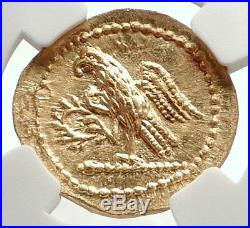
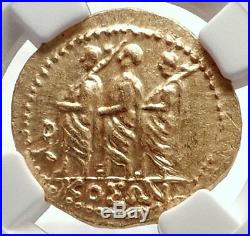
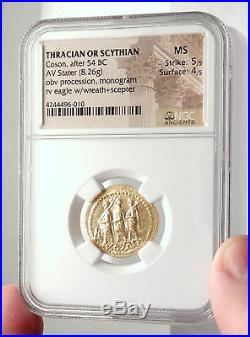

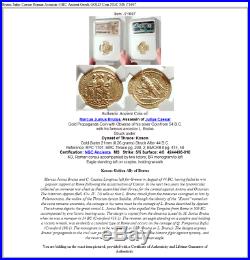

Authentic Ancient Coin of. Assassin of Julius Caesar. Gold Propaganda Coin with Obverse of his silver Coin from 54 B. With his famous ancestor L. Brutus Struck under: Dynast of Thrace: Koson Gold Stater 21mm (8.26 grams) Struck After 44 B. Reference: RPC 1701; BMC Thrace pg. 208, 2; BMCRR II pg. 474, 48 Certification: NGC Ancients. MS Strike: 5/5 Surface: 4/5 4244496-010 KO , Roman consul accompanied by two lictors; BR monogram to left Eagle standing left on sceptre, holding wreath. Koson: Golden Ally of Brutus. Marcus Junius Brutus and C. Cassius Longinus left for Greece in August of 44 BC, having failed to win popular support at Rome following the assassination of Caesar. In the next two years the tyrannicides collected an immense war chest as they assembled their forces for the contest against Antony and Octavian. The historian Appian Bell. 75 tells us that L. Brutus struck from the treasures consigned to him by Polemocratia, the widow of the Thracian dynast Sadalas. Although the identity of the “Koson” named on the coins remains uncertain, the coinage in his name must be the coinage of L. Brutus described by Appian. The obverse depicts the great consul L. Junius Brutus, who expelled the Tarquins from Rome in 509 BC, accompanied by two lictors bearing axes. The design is copied from the denarius issued by M. Junius Brutus when he was a moneyer in 54 BC (Crawford 433/1). The reverse, an eagle standing on a sceptre and holding a victory wreath, was evidently a standard type at Rome and occurs on the coinage of Q. Pomponius Rufus (Crawford 398/1). The monogram is to be read as BR or LBR Brutus or L. The designs express Brutus’ propaganda in the civil war perfectly: the obverse represents the historic fight against tyranny, and the reverse represents the victorious Roman eagle. Lucius Junius Brutus was the founder of the Roman Republic and traditionally one of the first consuls in 509 BC. He was claimed as an ancestor of the Roman gens Junia, including Decimus Junius Brutus and Marcus Junius Brutus, the most famous of Julius Caesar’s assassins. Prior to the establishment of the Roman Republic, Rome had been ruled by kings. Brutus led the revolt that overthrew the last king, Lucius Tarquinius Superbus, after the rape of the noblewoman (and kinswoman of Brutus) Lucretia at the hands of Tarquin’s son Sextus Tarquinius. The account is from Livy’s Ab urbe condita and deals with a point in the history of Rome prior to reliable historical records (virtually all prior records were destroyed by the Gauls when they sacked Rome under Brennus in 390 BC or 387 BC). Overthrow of the Monarchy. Lucius Iunius Brutus, on right. Main article: Overthrow of the Roman monarchy. Brutus was the son of Tarquinia, daughter of Rome’s fifth king Lucius Tarquinius Priscus and sister to Rome’s seventh king Tarquinius Superbus. According to Livy, Brutus had a number of grievances against his uncle the king, amongst them was the fact that Tarquin had put to death a number of the chief men of Rome, including Brutus’ brother. Brutus avoided the distrust of Tarquin’s family by feigning slow-wittedness (in Latin brutus translates to dullard). He accompanied Tarquin’s sons on a trip to the Oracle of Delphi. The sons asked the oracle who would be the next ruler of Rome. The Oracle responded the next person to kiss his mother would become king. Brutus interpreted “mother” to mean the Earth, so he pretended to trip and kissed the ground. Brutus, along with Spurius Lucretius Tricipitinus, Publius Valerius Publicola, and Lucius Tarquinius Collatinus were summoned by Lucretia to Collatia after she had been raped by Sextus Tarquinius, the son of the king Tarquinius Superbus. Lucretia, believing that the rape dishonored her and her family, committed suicide by stabbing herself with a dagger after telling of what had befallen her. According to legend, Brutus grabbed the dagger from Lucretia’s breast after her death and immediately shouted for the overthrow of the Tarquins. The four men gathered the youth of Collatia, then went to Rome where Brutus, being at that time Tribunus Celerum , summoned the people to the forum and exhorted them to rise up against the king. The people voted for the deposition of the king, and the banishment of the royal family. Brutus, leaving Lucretius in command of the city, proceeded with armed men to the Roman army then camped at Ardea. The king, who had been with the army, heard of developments at Rome, and left the camp for the city before Brutus’ arrival. The army received Brutus as a hero, and the king’s sons were expelled from the camp. Tarquinius Superbus, meanwhile, was refused entry at Rome, and fled with his family into exile. The Oath of Brutus. According to Livy, Brutus’ first act after the expulsion of Lucius Tarquinius Superbus was to bring the people to swear an oath never to allow any man again to be king in Rome. Omnium primum avidum novae libertatis populum, ne postmodum flecti precibus aut donis regiis posset, iure iurando adegit neminem Romae passuros regnare. First of all, by swearing an oath that they would suffer no man to rule Rome, it forced the people, desirous of a new liberty, not to be thereafter swayed by the entreaties or bribes of kings. This is, fundamentally, a restatement of the’private oath’ sworn by the conspirators to overthrow the monarchy. Castissimum ante regiam iniuriam sanguinem iuro, vosque, di, testes facio me L. Tarquinium Superbum cum scelerata coniuge et omni liberorum stirpe ferro igni quacumque dehinc vi possim exsecuturum, nec illos nec alium quemquam regnare Romae passurum. There is no scholarly agreement that the oath took place; it is reported, although differently, by Plutarch (Poplicola , 2) and Appian B. Brutus and Lucretia’s bereaved husband, Lucius Tarquinius Collatinus, were elected as the first consuls of Rome (509 BC). However, Tarquinius was soon replaced by Publius Valerius Publicola. Brutus’ first acts during his consulship, according to Livy, included administering an oath to the people of Rome to never again accept a king in Rome (see above) and replenishing the number of senators to 300 from the principal men of the equites. During his consulship the royal family made an attempt to regain the throne, firstly by their ambassadors seeking to subvert a number of the leading Roman citizens in the Tarquinian conspiracy. Amongst the conspirators were two brothers of Brutus’ wife Vitellia, and Brutus’ two sons, Titus Junius Brutus and Tiberius Junius Brutus. The conspiracy was discovered and the consuls determined to punish the conspirators with death. Brutus gained respect for his stoicism in watching the execution of his own sons, even though he showed emotion during the punishment. Tarquin again sought to retake the throne soon after at the Battle of Silva Arsia, leading the forces of Tarquinii and Veii against the Roman army. Valerius led the infantry, and Brutus led the cavalry. Aruns, the king’s son, led the Etruscan cavalry. The cavalry first joined battle and Aruns, having spied from afar the lictors, and thereby recognizing the presence of a consul, soon saw that Brutus was in command of the cavalry. The two men, who were cousins, charged each other, and speared each other to death. The infantry also soon joined the battle, the result being in doubt for some time. The right wing of each army was victorious, the army of Tarquinii forcing back the Romans, and the Veientes being routed. However the Etruscan forces eventually fled the field, the Romans claiming the victory. The surviving consul, Valerius, after celebrating a triumph for the victory, held a funeral for Brutus with much magnificence. The Roman noblewomen mourned him for one year, for his vengeance of Lucretia’s violation. Brutus in literature and art. The Lictors Bring to Brutus the Bodies of His Sons by David, 1789. Lucius Junius Brutus is quite prominent in English literature, and he was quite popular among British and American Whigs. A reference to L. Brutus is in the following lines from Shakespeare’s play The Tragedie of Julius Cæsar , (Cassius to Marcus Brutus, Act 1, Scene 2). O, you and I have heard our fathers say, There was a Brutus once that would have brooktTh’eternal devil to keep his state in RomeAs easily as a king. One of the main charges of the senatorial faction that plotted against Julius Caesar after he had the Roman Senate declare him dictator for life, was that he was attempting to make himself a king, and a co-conspirator Cassius, enticed Brutus’ direct descendant, Marcus Junius Brutus, to join the conspiracy by referring to his ancestor. Brutus is a leading character in Shakespeare’s Rape of Lucrece and in Nathaniel Lee’s Restoration tragedy (1680), Lucius Junius Brutus; Father of his Country. In The Mikado , Nanki-poo refers to his father as “the Lucius Junius Brutus of his race”. The memory of L. Brutus also had a profound impact on Italian patriots, including those who established the ill-fated Roman Republic in February 1849. Brutus was a hero of republicanism during the Enlightenment and Neoclassical periods. In 1789, at the dawn of the French Revolution, master painter Jacques-Louis David publicly exhibited his politically charged masterwork, The Lictors Bring to Brutus the Bodies of His Sons , to great controversy. Marcus Junius Brutus (early June, 85 BC – late October, 42 BC), often referred to as Brutus , was a politician of the late Roman Republic. He is best known in modern times for taking a leading role in the assassination of Julius Caesar. Marcus Junius Brutus the Younger was the son of Marcus Junius Brutus the Elder and Servilia Caepionis. His father was killed by Pompey the Great in dubious circumstances after he had taken part in the rebellion of Lepidus; his mother was the half-sister of Cato the Younger, and later Julius Caesar’s mistress. Some sources refer to the possibility of Caesar being his real father, despite Caesar’s being only 15 years old when Brutus was born. Brutus’ uncle, Quintus Servilius Caepio, adopted him in about 59 BC, and Brutus was known officially for a time as Quintus Servilius Caepio Brutus before he reverted to using his birth-name. Following Caesar’s assassination in 44 BC, Brutus revived his adoptive name in order to illustrate his links to another famous tyrannicide, Gaius Servilius Ahala, from whom he was descended. Brutus held his uncle in high regard and his political career started when he became an assistant to Cato, during his governorship of Cyprus. From his first appearance in the Senate, Brutus aligned with the Optimates (the conservative faction) against the First Triumvirate of Marcus Licinius Crassus, Gnaeus Pompeius Magnus and Gaius Julius Caesar. When civil war broke out in 49 BC between Pompey and Caesar, Brutus followed his old enemy and present leader of the Optimates, Pompey. When the Battle of Pharsalus began, Caesar ordered his officers to take Brutus prisoner if he gave himself up voluntarily, and if he persisted in fighting against capture, to let him alone and do him no violence. After the disaster of the Battle of Pharsalus, Brutus wrote to Caesar with apologies and Caesar immediately forgave him. Caesar then accepted him into his inner circle and made him governor of Gaul when he left for Africa in pursuit of Cato and Metellus Scipio. In 45 BC, Caesar nominated Brutus to serve as urban praetor for the following year. Also, in June 45 BC, Brutus divorced his wife and married his first cousin, Porcia Catonis, Cato’s daughter. According to Cicero the marriage caused a semi-scandal as Brutus failed to state a valid reason for his divorce from Claudia other than he wished to marry Porcia. The marriage also caused a rift between Brutus and his mother, who resented the affection Brutus had for Porcia. Assassination of Julius Caesar (44 BC). Main article: Assassination of Julius Caesar. Death of Caesar by Vincenzo Camuccini. Around this time, many senators began to fear Caesar’s growing power following his appointment as dictator for life. Brutus was persuaded into joining the conspiracy against Caesar by the other senators. Eventually, Brutus decided to move against Caesar after Caesar’s king-like behavior prompted him to take action. His wife was the only woman privy to the plot. The conspirators planned to carry out their plot on the Ides of March (March 15) that same year. On that day, Caesar was delayed going to the Senate because his wife, Calpurnia Pisonis, tried to convince him not to go. The conspirators feared the plot had been found out. Brutus persisted, however, waiting for Caesar at the Senate, and allegedly still chose to remain even when a messenger brought him news that would otherwise have caused him to leave. When Caesar finally did come to the Senate, they attacked him. Publius Servilius Casca Longus was allegedly the first to attack Caesar with a blow to the shoulder, which Caesar blocked. However, upon seeing Brutus was with the conspirators, he covered his face with his toga and resigned himself to his fate. The conspirators attacked in such numbers that they even wounded one another. Brutus is said to have been wounded in the hand and in the legs. After the assassination, the Senate passed an amnesty on the assassins. This amnesty was proposed by Caesar’s friend and co-consul Marcus Antonius. Nonetheless, uproar among the population caused Brutus and the conspirators to leave Rome. Brutus settled in Crete from 44 to 42 BC. In 43 BC, after Octavian received his consulship from the Roman Senate, one of his first actions was to have the people that had assassinated Julius Caesar declared murderers and enemies of the state. Marcus Tullius Cicero, angry at Octavian, wrote a letter to Brutus explaining that the forces of Octavian and Marcus Antonius were divided. Antonius had laid siege to the province of Gaul, where he wanted a governorship. In response to this siege, Octavian rallied his troops and fought a series of battles in which Antonius was defeated. Battle of Philippi (42 BC). Upon hearing that neither Antonius nor Octavian had an army big enough to defend Rome, Brutus rallied his troops, which totaled about 17 legions. When Octavian heard that Brutus was on his way to Rome, he made peace with Antonius. Their armies, which together totaled about 19 legions, marched to meet Brutus and Gaius Cassius Longinus. The two sides met in two engagements known as the Battle of Philippi. The first was fought on October 3, 42 BC, in which Brutus defeated Octavian’s forces, although Cassius was defeated by Antonius’ forces. The second engagement was fought on October 23, 42 BC and ended in Brutus’ defeat. After the defeat, he fled into the nearby hills with only about four legions. Knowing his army had been defeated and that he would be captured, Brutus committed suicide. Among his last words were, according to Plutarch, By all means must we fly; not with our feet, however, but with our hands. Brutus also uttered the well-known verse calling down a curse upon Antonius (Plutarch repeats this from the memoirs of Publius Volumnius): Forget not, Zeus, the author of these crimes (in the Dryden translation this passage is given as Punish, great Jove, the author of these ills). Plutarch wrote that, according to Volumnius, Brutus repeated two verses, but Volumnius was only able to recall the one quoted. Antonius, as a show of great respect, ordered Brutus’ body to be wrapped in Antonius’ most expensive purple mantle (this was later stolen and Antonius had the thief executed). Brutus was cremated, and his ashes were sent to his mother, Servilia Caepionis. His wife Porcia was reported to have committed suicide upon hearing of her husband’s death, although, according to Plutarch (Brutus 53 para 2), there is some dispute as to whether this is the case: Plutarch states that there is a letter in existence that was allegedly written by Brutus mourning the manner of her death. 85 BC: Brutus was born in Rome to Marcus Junius Brutus The Elder and Servilia Caepionis. 58 BC: He was made assistant to Cato, governor of Cyprus which helped him start his political career. 53 BC: He was given the quaestorship in Cilicia. 49 BC: Brutus followed Pompey to Greece during the civil war against Caesar. 48 BC: Brutus was pardoned by Caesar. 46 BC: He was made governor of Gaul. 45 BC: He was made Praetor. 44 BC: Murdered Caesar with other liberatores; went to Athens and then to Crete. 42 BC: Battle with Marcus Antonius’s forces. This was the noblest Roman of them all: All the conspirators save only he Did that they did in envy of great Caesar; He only, in a general honest thought And common good to all, made one of them. His life was gentle, and the elements So mix’d in him that Nature might stand up And say to all the world This was a man! William Shakespeare, Julius Caesar , Act 5, Scene 5 (Mark Antony). The phrase Sic semper tyrannis! Thus, ever (or always), to tyrants! Is attributed to Brutus at Caesar’s assassination. The phrase is also the official motto of the Commonwealth of Virginia. John Wilkes Booth, the assassin of Abraham Lincoln, claimed to be inspired by Brutus. Booth’s father, Junius Brutus Booth, was named for Brutus, and Booth (as Marcus Antonius) and his brother (as Brutus) had performed in a production of Julius Caesar in New York just six months before the assassination. On the night of the assassination, Booth is alleged to have shouted “Sic semper tyrannis” while leaping to the stage of Ford’s Theater. And why; For doing what Brutus was honored for… Booth was also known to be greatly attracted to Caesar himself, having played both Brutus and Caesar upon various stages. The well-known phrase Et tu, Brute? Is famous as Caesar’s utterance in the play Julius Caesar, although it is not his last words, and the sources describing Caesar’s death disagree about what his last words were. In Dante’s Inferno , Brutus is one of three people deemed sinful enough to be chewed in one of the three mouths of Satan, in the very center of Hell, for all eternity. The other two are Cassius, who was Brutus’s fellow conspirator and Judas Iscariot (Canto XXXIV). Dante condemned these three in the afterlife for being Treacherous Against Their Masters and enemies of the King/Emperor. Shakespeare’s play Julius Caesar depicts Caesar’s assassination by Brutus and his accomplices, and the murderers’ subsequent downfall. In the final scene, Marcus Antonius describes Brutus as “the noblest Roman of them all”, for he was the only conspirator who acted for the good of Rome. In the Masters of Rome novels of Colleen McCullough, Brutus is portrayed as a timid intellectual who hates Caesar for personal reasons, foremost of them the fact that his marriage arrangement with Caesar’s daughter, Julia, whom Brutus deeply loved, was dissolved in Caesar’s political gamble to give his daughter’s hand to Pompey to cement with him an alliance. Cassius and Trebonius use him as a figurehead because of his family connections, and his descendence from the founder of the Republic. He appears in Fortune’s Favourites , Caesar’s Women , Caesar and The October Horse. Ides of March is an epistolatory novel by Thornton Wilder dealing with characters and events leading to, and culminating in, the assassination of Julius Caesar. In the TV series Rome , Brutus, portrayed by Tobias Menzies, is depicted as a young man torn between what he believes is right, and his loyalty and love of a man who has been like a father to him. In the series, his personality and motives are accurate but Brutus’ relationship to Cassius and Cato is not mentioned, and his three sisters and wife Porcia are omitted from the series completely. Brutus is an occasional supporting character in Asterix comics, most notably Asterix and Son in which he is the main antagonist. The character appears in the live Asterix film adaptations – though briefly in the first two – Asterix and Obelix vs Caesar (played by Didier Cauchy) and Asterix at the Olympic Games. In the latter film, he is portrayed as a comical villain by Belgian actor Benoît Poelvoorde: he is a central character to the film, even though he was not depicted in the original Asterix at the Olympic Games comic book. Following sources cited in Plutarch, he is implied in that film to be Julius Caesar’s biological son. The Hives’ song “B is for Brutus” contains titular and lyrical references to Junius Brutus. The Roman Republic was the phase of the ancient Roman civilization characterized by a republican form of government. It began with the overthrow of the Roman monarchy, c. 509 BC, and lasted over 450 years until its subversion, through a series of civil wars, into the Principate form of government and the Imperial period. The Roman Republic was governed by a complex constitution, which centered on the principles of a separation of powers and checks and balances. The evolution of the constitution was heavily influenced by the struggle between the aristocracy (the patricians), and other talented Romans who were not from famous families, the plebeians. Early in its history, the republic was controlled by an aristocracy of individuals who could trace their ancestry back to the early history of the kingdom. Over time, the laws that allowed these individuals to dominate the government were repealed, and the result was the emergence of a new aristocracy which depended on the structure of society, rather than the law, to maintain its dominance. During the first two centuries, the Republic saw its territory expand from central Italy to the entire Mediterranean world. In the next century, Rome grew to dominate North Africa, the Iberian Peninsula, Greece, and what is now southern France. During the last two centuries of the Roman Republic, it grew to dominate the rest of modern France, as well as much of the east. At this point, the republican political machinery was replaced with imperialism. The precise event which signaled the end of the Roman Republic and the transition into the Roman Empire is a matter of interpretation. Towards the end of the period a selection of Roman leaders came to so dominate the political arena that they exceeded the limitations of the Republic as a matter of course. Historians have variously proposed the appointment of Julius Caesar as perpetual dictator in 44 BC, the defeat of Mark Antony at the Battle of Actium in 31 BC, and the Roman Senate’s grant of extraordinary powers to Octavian (Augustus) under the first settlement in 27 BC, as candidates for the defining pivotal event ending the Republic. Many of Rome’s legal and legislative structures can still be observed throughout Europe and the rest of the world by modern nation state and international organizations. The Romans’ Latin language has influenced grammar and vocabulary across parts of Europe and the world. World-renowned expert numismatist, enthusiast, author and dealer in authentic ancient Greek, ancient Roman, ancient Byzantine, world coins & more. Ilya Zlobin is an independent individual who has a passion for coin collecting, research and understanding the importance of the historical context and significance all coins and objects represent. Send me a message about this and I can update your invoice should you want this method. Getting your order to you, quickly and securely is a top priority and is taken seriously here. Great care is taken in packaging and mailing every item securely and quickly. What is a certificate of authenticity and what guarantees do you give that the item is authentic? You will be very happy with what you get with the COA; a professional presentation of the coin, with all of the relevant information and a picture of the coin you saw in the listing. Additionally, the coin is inside it’s own protective coin flip (holder), with a 2×2 inch description of the coin matching the individual number on the COA. Whether your goal is to collect or give the item as a gift, coins presented like this could be more prized and valued higher than items that were not given such care and attention to. When should I leave feedback? Please don’t leave any negative feedbacks, as it happens sometimes that people rush to leave feedback before letting sufficient time for their order to arrive. The matter of fact is that any issues can be resolved, as reputation is most important to me. My goal is to provide superior products and quality of service. How and where do I learn more about collecting ancient coins? Visit the Guide on How to Use My Store. For on an overview about using my store, with additional information and links to all other parts of my store which may include educational information on topics you are looking for. The item “Brutus Julius Caesar Roman Assassin 44BC Ancient Greek GOLD Coin NGC MS i71697″ is in sale since Sunday, August 19, 2018. This item is in the category “Coins & Paper Money\Coins\ Ancient\Greek (450 BC-100 AD)”. The seller is “highrating_lowprice” and is located in Rego Park, New York. This item can be shipped worldwide.
- Coin Type: Ancient
- Certification Number: 4244496-010
- Certification: NGC
- Grade: MS
- Composition: Gold
- Culture: Greek

CARTHAGE Genuine Ancient 320BC Electrum Gold Silver Alloy Greek Coin NGC i68162
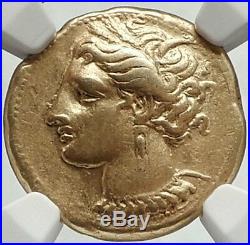
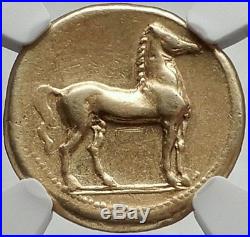
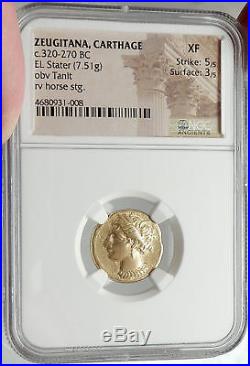



Item: i68162 Authentic Ancient Coin of. Greek city of Carthage. In Zeugitana Electrum (Gold and Silver Alloy) Stater 18mm (7.51 grams) Struck circa 320-270 B. Reference: Sear 6462 Certification: NGC Ancients. XF Strike: 5/5 Surface: 3/5 4680931-008 Head of Tanit. Left, wreathed with corn, wearing necklace and ear-ring. Standing right on double exergual line; pellet in lower field before horse’s fore-hooves. Tanit was a Phoenician lunar goddess, worshiped as the patron goddess at Carthage where from the fifth century BCE onwards her name is associated with that of Baal Hammon and she is given the epithet pene baal (“face of Baal”) and the title rabat , the female form of rab (chief) (Markoe 2000:130). Tanit and Baal Hammon were worshiped in Punic contexts in the Western Mediterranean, from Malta to Gades into Hellenistic times. In North Africa, where the inscriptions and material remains are more plentiful, she was, as well as a consort of Baal, a heavenly goddess of war, a virginal mother goddess and nurse, and, less specifically, a symbol of fertility. Several of the major Greek goddesses were identified with Tanit by the syncretic interpretatio graeca , which recognized as Greek deities in foreign guise the gods of most of the surrounding non-Hellene cultures. Her shrine excavated at Sarepta in southern Phoenicia revealed an inscription that identified her for the first time in her homeland and related her securely to the Phoenician goddess Astarte (Ishtar). One site where Tanit was uncovered is at Kerkouan, in the Cap Bon peninsula in Tunisia. The origins of Tanit are to be found in the pantheon of Ugarit, especially in the Ugaritic goddess Anat (Hvidberg-Hansen 1982), a consumer of blood and flesh. There is significant, albeit disputed, evidence, both archaeological and within ancient written sources (Markoe 2000:136), pointing towards child sacrifice forming part of the worship of Tanit and Baal Hammon. Tanit was also a goddess among the ancient Berber people. Her symbol, found on many ancient stone carvings, appears as a trapezoid/trapezium closed by a horizontal line at the top and surmounted in the middle by a circle: the horizontal arm was often terminated either by two short upright lines at right angles to it or by hooks. Later, the trapezoid/trapezium was frequently replaced by an isosceles triangle. The symbol is interpreted by Hvidberg-Hansen as a woman raising her hands. In Egyptian, her name means Land of Neith , Neith being a war goddess. In modern times the name, with the spelling “Tanith”, has been used as a female given name, both for real people and, more frequently, in occult fiction. Carthage (Arabic: Qarj , Ancient Greek: Karkhdn , Kartajen , Hebrew: kartago , Latin: Carthago or Karthago , from the Phoenician Qart-adat meaning New City , implying it was a’new Tyre’) refers to a series of cities on the Gulf of Tunis, from a Phoenician colony of the 1st millennium BCE to the current suburb outside Tunis, Tunisia. The first civilization that developed within the city’s sphere of influence is referred to as Punic (a form of the word “Phoenician”) or Carthaginian. The city of Carthage is located on the eastern side of Lake Tunis across from the centre of Tunis. According to Roman legend it was founded in 814 BCE by Phoenician colonists from Tyre under the leadership of Elissa (Queen Dido). It became a large and rich city and thus a major power in the Mediterranean. The resulting rivalry with Syracuse and Rome was accompanied by several wars with respective invasions of each other’s homeland. Hannibal’s invasion of Italy in the Second Punic War culminated in the Carthaginian victory at Cannae and led to a serious threat to the continuation of Roman rule over Italy; however, Carthage emerged from the conflict at its historical weakest. After the Third Punic War, the city was destroyed by the Romans in 146 BCE. However, the Romans refounded Carthage, which became one of the three most important cities of the Empire and the capital of the short-lived Vandal kingdom. It remained one of the most important Roman cities until the Muslim conquest when it was destroyed a second time in CE 698. The study of the history of Carthage is often problematic. Due to the subjugation of the civilization by the Romans at the end of the Third Punic War, very few Carthaginian historical primary sources survive. There are a few ancient translations of Punic texts into Greek and Latin, as well as inscriptions on monuments and buildings discovered in North Africa. However, the majority of available primary source material about Carthaginian civilization was written by Greek and Roman historians, such as Livy, Polybius, Appian, Cornelius Nepos, Silius Italicus, Plutarch, Dio Cassius, and Herodotus. These authors came from cultures which were nearly always in competition, and often in conflict, with Carthage. The Greeks contested with Carthage for Sicily, for instance, and the Romans fought the Punic Wars against Carthage. Inevitably the accounts of Carthage written by outsiders include significant bias. Recent excavation of ancient Carthaginian sites has brought much more primary material to light. Some of these finds contradict or confirm aspects of the traditional picture of Carthage, but much of the material is still ambiguous. Carthage was one of a number of Phoenician settlements in the western Mediterranean that was created to facilitate trade from the cities of Sidon, Tyre and others from Phoenicia, which was situated in the coast of what is now Syria, Lebanon and Israel. In the 10th century BC, the eastern Mediterranean shore was inhabited by various Semitic-speaking populations, who had built up flourishing civilizations. The people inhabiting what is now Lebanon called their language Canaanite, but were referred to as Phoenicians by the Greeks. The Phoenician language was very close to ancient Hebrew, to such a degree that the latter is often used as an aid in translation of Phoenician inscriptions. The Phoenician cities were highly dependent on both land- and seaborne trade and their cities included a number of major ports in the area. In order to provide a resting place for their merchant fleets, to maintain a Phoenician monopoly on an area’s natural resource, or to conduct trade on its own, the Phoenicians established numerous colonial cities along the coasts of the Mediterranean, stretching from Iberia to the Black Sea. They were stimulated to found their cities by a need for revitalizing trade in order to pay the tribute extracted from Tyre, Sidon, and Byblos by the succession of empires that ruled them and later by fear of complete Greek colonization of that part of the Mediterranean suitable for commerce. The initial Phoenician colonization took place during a time when other neighboring kingdoms (Greek, Hittite, Cretan) were suffering from a “Dark Age”, perhaps after the activities of the Sea Peoples. Carthage was founded by Phoenician settlers from the city of Tyre, who brought with them the city-god Melqart. Philistos of Syracuse dates the founding of Carthage to c. 1215 BC, while the Roman historian Appian dates the founding 50 years prior to the Trojan War i. Between 1244 and 1234 BC, according to the chronology of Eratosthenes. The Roman poet Virgil imagines that the city’s founding coincides with the end of the Trojan War. However, it is most likely that the city was founded sometime between 846 and 813 BC. World-renowned expert numismatist, enthusiast, author and dealer in authentic ancient Greek, ancient Roman, ancient Byzantine, world coins & more. Ilya Zlobin is an independent individual who has a passion for coin collecting, research and understanding the importance of the historical context and significance all coins and objects represent. Send me a message about this and I can update your invoice should you want this method. Getting your order to you, quickly and securely is a top priority and is taken seriously here. Great care is taken in packaging and mailing every item securely and quickly. What is a certificate of authenticity and what guarantees do you give that the item is authentic? You will be very happy with what you get with the COA; a professional presentation of the coin, with all of the relevant information and a picture of the coin you saw in the listing. Additionally, the coin is inside it’s own protective coin flip (holder), with a 2×2 inch description of the coin matching the individual number on the COA. Whether your goal is to collect or give the item as a gift, coins presented like this could be more prized and valued higher than items that were not given such care and attention to. When should I leave feedback? Please don’t leave any negative feedbacks, as it happens sometimes that people rush to leave feedback before letting sufficient time for their order to arrive. The matter of fact is that any issues can be resolved, as reputation is most important to me. My goal is to provide superior products and quality of service. How and where do I learn more about collecting ancient coins? Visit the “Guide on How to Use My Store”. For on an overview about using my store, with additional information and links to all other parts of my store which may include educational information on topics you are looking for. The item “CARTHAGE Genuine Ancient 320BC Electrum Gold Silver Alloy Greek Coin NGC i68162″ is in sale since Sunday, March 25, 2018. This item is in the category “Coins & Paper Money\Coins\ Ancient\Greek (450 BC-100 AD)”. The seller is “highrating_lowprice” and is located in Rego Park, New York. This item can be shipped worldwide.
- Culture: Greek
- Coin Type: Ancient
- Denomination: Stater
- Composition: Electrum (Gold and Silver Alloy)
- Era: Ancient Greece
- Material: Silver
- Certification: NGC
- Certification Number: 4680931-008
- Grade: XF

Brutus Julius Caesar Roman Assassin 44BC Ancient Greek GOLD Coin NGC MS i66630
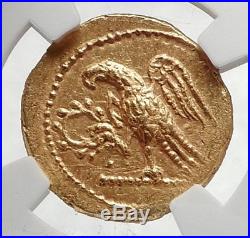
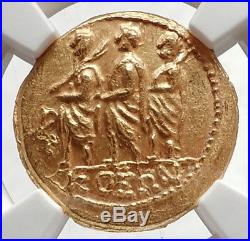
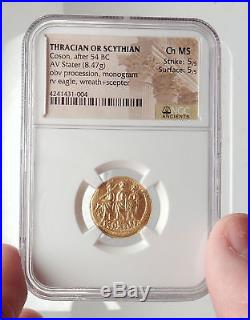
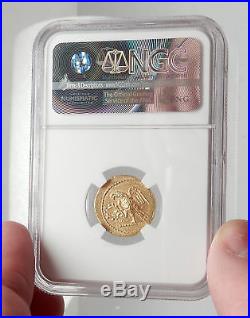


Authentic Ancient Coin of. Assassin of Julius Caesar. Gold Propaganda Coin with Obverse of his silver Coin from 54 B. With his famous ancestor L. Brutus Struck under: Dynast of Thrace: Koson Gold Stater 20mm (8.47 grams) Struck After 44 B. Reference: RPC 1701; BMC Thrace pg. 208, 2; BMCRR II pg. 474, 48 Certification: NGC Ancients. Ch MS Strike: 5/5 Surface: 5/5 4241431-004 KO , Roman consul accompanied by two lictors; BR monogram to left Eagle standing left on sceptre, holding wreath. Koson: Golden Ally of Brutus. Marcus Junius Brutus and C. Cassius Longinus left for Greece in August of 44 BC, having failed to win popular support at Rome following the assassination of Caesar. In the next two years the tyrannicides collected an immense war chest as they assembled their forces for the contest against Antony and Octavian. The historian Appian Bell. 75 tells us that L. Brutus struck from the treasures consigned to him by Polemocratia, the widow of the Thracian dynast Sadalas. Although the identity of the “Koson” named on the coins remains uncertain, the coinage in his name must be the coinage of L. Brutus described by Appian. The obverse depicts the great consul L. Junius Brutus, who expelled the Tarquins from Rome in 509 BC, accompanied by two lictors bearing axes. The design is copied from the denarius issued by M. Junius Brutus when he was a moneyer in 54 BC (Crawford 433/1). The reverse, an eagle standing on a sceptre and holding a victory wreath, was evidently a standard type at Rome and occurs on the coinage of Q. Pomponius Rufus (Crawford 398/1). The monogram is to be read as BR or LBR Brutus or L. The designs express Brutus’ propaganda in the civil war perfectly: the obverse represents the historic fight against tyranny, and the reverse represents the victorious Roman eagle. Lucius Junius Brutus was the founder of the Roman Republic and traditionally one of the first consuls in 509 BC. He was claimed as an ancestor of the Roman gens Junia, including Decimus Junius Brutus and Marcus Junius Brutus, the most famous of Julius Caesar’s assassins. Prior to the establishment of the Roman Republic, Rome had been ruled by kings. Brutus led the revolt that overthrew the last king, Lucius Tarquinius Superbus, after the rape of the noblewoman (and kinswoman of Brutus) Lucretia at the hands of Tarquin’s son Sextus Tarquinius. The account is from Livy’s Ab urbe condita and deals with a point in the history of Rome prior to reliable historical records (virtually all prior records were destroyed by the Gauls when they sacked Rome under Brennus in 390 BC or 387 BC). Overthrow of the Monarchy. Lucius Iunius Brutus, on right. Main article: Overthrow of the Roman monarchy. Brutus was the son of Tarquinia, daughter of Rome’s fifth king Lucius Tarquinius Priscus and sister to Rome’s seventh king Tarquinius Superbus. According to Livy, Brutus had a number of grievances against his uncle the king, amongst them was the fact that Tarquin had put to death a number of the chief men of Rome, including Brutus’ brother. Brutus avoided the distrust of Tarquin’s family by feigning slow-wittedness (in Latin brutus translates to dullard). He accompanied Tarquin’s sons on a trip to the Oracle of Delphi. The sons asked the oracle who would be the next ruler of Rome. The Oracle responded the next person to kiss his mother would become king. Brutus interpreted “mother” to mean the Earth, so he pretended to trip and kissed the ground. Brutus, along with Spurius Lucretius Tricipitinus, Publius Valerius Publicola, and Lucius Tarquinius Collatinus were summoned by Lucretia to Collatia after she had been raped by Sextus Tarquinius, the son of the king Tarquinius Superbus. Lucretia, believing that the rape dishonored her and her family, committed suicide by stabbing herself with a dagger after telling of what had befallen her. According to legend, Brutus grabbed the dagger from Lucretia’s breast after her death and immediately shouted for the overthrow of the Tarquins. The four men gathered the youth of Collatia, then went to Rome where Brutus, being at that time Tribunus Celerum , summoned the people to the forum and exhorted them to rise up against the king. The people voted for the deposition of the king, and the banishment of the royal family. Brutus, leaving Lucretius in command of the city, proceeded with armed men to the Roman army then camped at Ardea. The king, who had been with the army, heard of developments at Rome, and left the camp for the city before Brutus’ arrival. The army received Brutus as a hero, and the king’s sons were expelled from the camp. Tarquinius Superbus, meanwhile, was refused entry at Rome, and fled with his family into exile. The Oath of Brutus. According to Livy, Brutus’ first act after the expulsion of Lucius Tarquinius Superbus was to bring the people to swear an oath never to allow any man again to be king in Rome. Omnium primum avidum novae libertatis populum, ne postmodum flecti precibus aut donis regiis posset, iure iurando adegit neminem Romae passuros regnare. First of all, by swearing an oath that they would suffer no man to rule Rome, it forced the people, desirous of a new liberty, not to be thereafter swayed by the entreaties or bribes of kings. This is, fundamentally, a restatement of the’private oath’ sworn by the conspirators to overthrow the monarchy. Castissimum ante regiam iniuriam sanguinem iuro, vosque, di, testes facio me L. Tarquinium Superbum cum scelerata coniuge et omni liberorum stirpe ferro igni quacumque dehinc vi possim exsecuturum, nec illos nec alium quemquam regnare Romae passurum. There is no scholarly agreement that the oath took place; it is reported, although differently, by Plutarch (Poplicola , 2) and Appian B. Brutus and Lucretia’s bereaved husband, Lucius Tarquinius Collatinus, were elected as the first consuls of Rome (509 BC). However, Tarquinius was soon replaced by Publius Valerius Publicola. Brutus’ first acts during his consulship, according to Livy, included administering an oath to the people of Rome to never again accept a king in Rome (see above) and replenishing the number of senators to 300 from the principal men of the equites. During his consulship the royal family made an attempt to regain the throne, firstly by their ambassadors seeking to subvert a number of the leading Roman citizens in the Tarquinian conspiracy. Amongst the conspirators were two brothers of Brutus’ wife Vitellia, and Brutus’ two sons, Titus Junius Brutus and Tiberius Junius Brutus. The conspiracy was discovered and the consuls determined to punish the conspirators with death. Brutus gained respect for his stoicism in watching the execution of his own sons, even though he showed emotion during the punishment. Tarquin again sought to retake the throne soon after at the Battle of Silva Arsia, leading the forces of Tarquinii and Veii against the Roman army. Valerius led the infantry, and Brutus led the cavalry. Aruns, the king’s son, led the Etruscan cavalry. The cavalry first joined battle and Aruns, having spied from afar the lictors, and thereby recognizing the presence of a consul, soon saw that Brutus was in command of the cavalry. The two men, who were cousins, charged each other, and speared each other to death. The infantry also soon joined the battle, the result being in doubt for some time. The right wing of each army was victorious, the army of Tarquinii forcing back the Romans, and the Veientes being routed. However the Etruscan forces eventually fled the field, the Romans claiming the victory. The surviving consul, Valerius, after celebrating a triumph for the victory, held a funeral for Brutus with much magnificence. The Roman noblewomen mourned him for one year, for his vengeance of Lucretia’s violation. Brutus in literature and art. The Lictors Bring to Brutus the Bodies of His Sons by David, 1789. Lucius Junius Brutus is quite prominent in English literature, and he was quite popular among British and American Whigs. A reference to L. Brutus is in the following lines from Shakespeare’s play The Tragedie of Julius Cæsar , (Cassius to Marcus Brutus, Act 1, Scene 2). O, you and I have heard our fathers say, There was a Brutus once that would have brooktTh’eternal devil to keep his state in RomeAs easily as a king. One of the main charges of the senatorial faction that plotted against Julius Caesar after he had the Roman Senate declare him dictator for life, was that he was attempting to make himself a king, and a co-conspirator Cassius, enticed Brutus’ direct descendant, Marcus Junius Brutus, to join the conspiracy by referring to his ancestor. Brutus is a leading character in Shakespeare’s Rape of Lucrece and in Nathaniel Lee’s Restoration tragedy (1680), Lucius Junius Brutus; Father of his Country. In The Mikado , Nanki-poo refers to his father as “the Lucius Junius Brutus of his race”. The memory of L. Brutus also had a profound impact on Italian patriots, including those who established the ill-fated Roman Republic in February 1849. Brutus was a hero of republicanism during the Enlightenment and Neoclassical periods. In 1789, at the dawn of the French Revolution, master painter Jacques-Louis David publicly exhibited his politically charged masterwork, The Lictors Bring to Brutus the Bodies of His Sons , to great controversy. Marcus Junius Brutus (early June, 85 BC – late October, 42 BC), often referred to as Brutus , was a politician of the late Roman Republic. He is best known in modern times for taking a leading role in the assassination of Julius Caesar. Marcus Junius Brutus the Younger was the son of Marcus Junius Brutus the Elder and Servilia Caepionis. His father was killed by Pompey the Great in dubious circumstances after he had taken part in the rebellion of Lepidus; his mother was the half-sister of Cato the Younger, and later Julius Caesar’s mistress. Some sources refer to the possibility of Caesar being his real father, despite Caesar’s being only 15 years old when Brutus was born. Brutus’ uncle, Quintus Servilius Caepio, adopted him in about 59 BC, and Brutus was known officially for a time as Quintus Servilius Caepio Brutus before he reverted to using his birth-name. Following Caesar’s assassination in 44 BC, Brutus revived his adoptive name in order to illustrate his links to another famous tyrannicide, Gaius Servilius Ahala, from whom he was descended. Brutus held his uncle in high regard and his political career started when he became an assistant to Cato, during his governorship of Cyprus. From his first appearance in the Senate, Brutus aligned with the Optimates (the conservative faction) against the First Triumvirate of Marcus Licinius Crassus, Gnaeus Pompeius Magnus and Gaius Julius Caesar. When civil war broke out in 49 BC between Pompey and Caesar, Brutus followed his old enemy and present leader of the Optimates, Pompey. When the Battle of Pharsalus began, Caesar ordered his officers to take Brutus prisoner if he gave himself up voluntarily, and if he persisted in fighting against capture, to let him alone and do him no violence. After the disaster of the Battle of Pharsalus, Brutus wrote to Caesar with apologies and Caesar immediately forgave him. Caesar then accepted him into his inner circle and made him governor of Gaul when he left for Africa in pursuit of Cato and Metellus Scipio. In 45 BC, Caesar nominated Brutus to serve as urban praetor for the following year. Also, in June 45 BC, Brutus divorced his wife and married his first cousin, Porcia Catonis, Cato’s daughter. According to Cicero the marriage caused a semi-scandal as Brutus failed to state a valid reason for his divorce from Claudia other than he wished to marry Porcia. The marriage also caused a rift between Brutus and his mother, who resented the affection Brutus had for Porcia. Assassination of Julius Caesar (44 BC). Main article: Assassination of Julius Caesar. Death of Caesar by Vincenzo Camuccini. Around this time, many senators began to fear Caesar’s growing power following his appointment as dictator for life. Brutus was persuaded into joining the conspiracy against Caesar by the other senators. Eventually, Brutus decided to move against Caesar after Caesar’s king-like behavior prompted him to take action. His wife was the only woman privy to the plot. The conspirators planned to carry out their plot on the Ides of March (March 15) that same year. On that day, Caesar was delayed going to the Senate because his wife, Calpurnia Pisonis, tried to convince him not to go. The conspirators feared the plot had been found out. Brutus persisted, however, waiting for Caesar at the Senate, and allegedly still chose to remain even when a messenger brought him news that would otherwise have caused him to leave. When Caesar finally did come to the Senate, they attacked him. Publius Servilius Casca Longus was allegedly the first to attack Caesar with a blow to the shoulder, which Caesar blocked. However, upon seeing Brutus was with the conspirators, he covered his face with his toga and resigned himself to his fate. The conspirators attacked in such numbers that they even wounded one another. Brutus is said to have been wounded in the hand and in the legs. After the assassination, the Senate passed an amnesty on the assassins. This amnesty was proposed by Caesar’s friend and co-consul Marcus Antonius. Nonetheless, uproar among the population caused Brutus and the conspirators to leave Rome. Brutus settled in Crete from 44 to 42 BC. In 43 BC, after Octavian received his consulship from the Roman Senate, one of his first actions was to have the people that had assassinated Julius Caesar declared murderers and enemies of the state. Marcus Tullius Cicero, angry at Octavian, wrote a letter to Brutus explaining that the forces of Octavian and Marcus Antonius were divided. Antonius had laid siege to the province of Gaul, where he wanted a governorship. In response to this siege, Octavian rallied his troops and fought a series of battles in which Antonius was defeated. Battle of Philippi (42 BC). Upon hearing that neither Antonius nor Octavian had an army big enough to defend Rome, Brutus rallied his troops, which totaled about 17 legions. When Octavian heard that Brutus was on his way to Rome, he made peace with Antonius. Their armies, which together totaled about 19 legions, marched to meet Brutus and Gaius Cassius Longinus. The two sides met in two engagements known as the Battle of Philippi. The first was fought on October 3, 42 BC, in which Brutus defeated Octavian’s forces, although Cassius was defeated by Antonius’ forces. The second engagement was fought on October 23, 42 BC and ended in Brutus’ defeat. After the defeat, he fled into the nearby hills with only about four legions. Knowing his army had been defeated and that he would be captured, Brutus committed suicide. Among his last words were, according to Plutarch, By all means must we fly; not with our feet, however, but with our hands. Brutus also uttered the well-known verse calling down a curse upon Antonius (Plutarch repeats this from the memoirs of Publius Volumnius): Forget not, Zeus, the author of these crimes (in the Dryden translation this passage is given as Punish, great Jove, the author of these ills). Plutarch wrote that, according to Volumnius, Brutus repeated two verses, but Volumnius was only able to recall the one quoted. Antonius, as a show of great respect, ordered Brutus’ body to be wrapped in Antonius’ most expensive purple mantle (this was later stolen and Antonius had the thief executed). Brutus was cremated, and his ashes were sent to his mother, Servilia Caepionis. His wife Porcia was reported to have committed suicide upon hearing of her husband’s death, although, according to Plutarch (Brutus 53 para 2), there is some dispute as to whether this is the case: Plutarch states that there is a letter in existence that was allegedly written by Brutus mourning the manner of her death. 85 BC: Brutus was born in Rome to Marcus Junius Brutus The Elder and Servilia Caepionis. 58 BC: He was made assistant to Cato, governor of Cyprus which helped him start his political career. 53 BC: He was given the quaestorship in Cilicia. 49 BC: Brutus followed Pompey to Greece during the civil war against Caesar. 48 BC: Brutus was pardoned by Caesar. 46 BC: He was made governor of Gaul. 45 BC: He was made Praetor. 44 BC: Murdered Caesar with other liberatores; went to Athens and then to Crete. 42 BC: Battle with Marcus Antonius’s forces. This was the noblest Roman of them all: All the conspirators save only he Did that they did in envy of great Caesar; He only, in a general honest thought And common good to all, made one of them. His life was gentle, and the elements So mix’d in him that Nature might stand up And say to all the world This was a man! William Shakespeare, Julius Caesar , Act 5, Scene 5 (Mark Antony). The phrase Sic semper tyrannis! Thus, ever (or always), to tyrants! Is attributed to Brutus at Caesar’s assassination. The phrase is also the official motto of the Commonwealth of Virginia. John Wilkes Booth, the assassin of Abraham Lincoln, claimed to be inspired by Brutus. Booth’s father, Junius Brutus Booth, was named for Brutus, and Booth (as Marcus Antonius) and his brother (as Brutus) had performed in a production of Julius Caesar in New York just six months before the assassination. On the night of the assassination, Booth is alleged to have shouted “Sic semper tyrannis” while leaping to the stage of Ford’s Theater. And why; For doing what Brutus was honored for… Booth was also known to be greatly attracted to Caesar himself, having played both Brutus and Caesar upon various stages. The well-known phrase Et tu, Brute? Is famous as Caesar’s utterance in the play Julius Caesar, although it is not his last words, and the sources describing Caesar’s death disagree about what his last words were. In Dante’s Inferno , Brutus is one of three people deemed sinful enough to be chewed in one of the three mouths of Satan, in the very center of Hell, for all eternity. The other two are Cassius, who was Brutus’s fellow conspirator and Judas Iscariot (Canto XXXIV). Dante condemned these three in the afterlife for being Treacherous Against Their Masters and enemies of the King/Emperor. Shakespeare’s play Julius Caesar depicts Caesar’s assassination by Brutus and his accomplices, and the murderers’ subsequent downfall. In the final scene, Marcus Antonius describes Brutus as “the noblest Roman of them all”, for he was the only conspirator who acted for the good of Rome. In the Masters of Rome novels of Colleen McCullough, Brutus is portrayed as a timid intellectual who hates Caesar for personal reasons, foremost of them the fact that his marriage arrangement with Caesar’s daughter, Julia, whom Brutus deeply loved, was dissolved in Caesar’s political gamble to give his daughter’s hand to Pompey to cement with him an alliance. Cassius and Trebonius use him as a figurehead because of his family connections, and his descendence from the founder of the Republic. He appears in Fortune’s Favourites , Caesar’s Women , Caesar and The October Horse. Ides of March is an epistolatory novel by Thornton Wilder dealing with characters and events leading to, and culminating in, the assassination of Julius Caesar. In the TV series Rome , Brutus, portrayed by Tobias Menzies, is depicted as a young man torn between what he believes is right, and his loyalty and love of a man who has been like a father to him. In the series, his personality and motives are accurate but Brutus’ relationship to Cassius and Cato is not mentioned, and his three sisters and wife Porcia are omitted from the series completely. Brutus is an occasional supporting character in Asterix comics, most notably Asterix and Son in which he is the main antagonist. The character appears in the live Asterix film adaptations – though briefly in the first two – Asterix and Obelix vs Caesar (played by Didier Cauchy) and Asterix at the Olympic Games. In the latter film, he is portrayed as a comical villain by Belgian actor Benoît Poelvoorde: he is a central character to the film, even though he was not depicted in the original Asterix at the Olympic Games comic book. Following sources cited in Plutarch, he is implied in that film to be Julius Caesar’s biological son. The Hives’ song “B is for Brutus” contains titular and lyrical references to Junius Brutus. The Roman Republic was the phase of the ancient Roman civilization characterized by a republican form of government. It began with the overthrow of the Roman monarchy, c. 509 BC, and lasted over 450 years until its subversion, through a series of civil wars, into the Principate form of government and the Imperial period. The Roman Republic was governed by a complex constitution, which centered on the principles of a separation of powers and checks and balances. The evolution of the constitution was heavily influenced by the struggle between the aristocracy (the patricians), and other talented Romans who were not from famous families, the plebeians. Early in its history, the republic was controlled by an aristocracy of individuals who could trace their ancestry back to the early history of the kingdom. Over time, the laws that allowed these individuals to dominate the government were repealed, and the result was the emergence of a new aristocracy which depended on the structure of society, rather than the law, to maintain its dominance. During the first two centuries, the Republic saw its territory expand from central Italy to the entire Mediterranean world. In the next century, Rome grew to dominate North Africa, the Iberian Peninsula, Greece, and what is now southern France. During the last two centuries of the Roman Republic, it grew to dominate the rest of modern France, as well as much of the east. At this point, the republican political machinery was replaced with imperialism. The precise event which signaled the end of the Roman Republic and the transition into the Roman Empire is a matter of interpretation. Towards the end of the period a selection of Roman leaders came to so dominate the political arena that they exceeded the limitations of the Republic as a matter of course. Historians have variously proposed the appointment of Julius Caesar as perpetual dictator in 44 BC, the defeat of Mark Antony at the Battle of Actium in 31 BC, and the Roman Senate’s grant of extraordinary powers to Octavian (Augustus) under the first settlement in 27 BC, as candidates for the defining pivotal event ending the Republic. Many of Rome’s legal and legislative structures can still be observed throughout Europe and the rest of the world by modern nation state and international organizations. The Romans’ Latin language has influenced grammar and vocabulary across parts of Europe and the world. World-renowned expert numismatist, enthusiast, author and dealer in authentic ancient Greek, ancient Roman, ancient Byzantine, world coins & more. Ilya Zlobin is an independent individual who has a passion for coin collecting, research and understanding the importance of the historical context and significance all coins and objects represent. Send me a message about this and I can update your invoice should you want this method. Getting your order to you, quickly and securely is a top priority and is taken seriously here. Great care is taken in packaging and mailing every item securely and quickly. What is a certificate of authenticity and what guarantees do you give that the item is authentic? You will be very happy with what you get with the COA; a professional presentation of the coin, with all of the relevant information and a picture of the coin you saw in the listing. Additionally, the coin is inside it’s own protective coin flip (holder), with a 2×2 inch description of the coin matching the individual number on the COA. Whether your goal is to collect or give the item as a gift, coins presented like this could be more prized and valued higher than items that were not given such care and attention to. When should I leave feedback? Please don’t leave any negative feedbacks, as it happens sometimes that people rush to leave feedback before letting sufficient time for their order to arrive. The matter of fact is that any issues can be resolved, as reputation is most important to me. My goal is to provide superior products and quality of service. How and where do I learn more about collecting ancient coins? Visit the Guide on How to Use My Store. For on an overview about using my store, with additional information and links to all other parts of my store which may include educational information on topics you are looking for. The item “Brutus Julius Caesar Roman Assassin 44BC Ancient Greek GOLD Coin NGC MS i66630″ is in sale since Tuesday, January 16, 2018. This item is in the category “Coins & Paper Money\Coins\ Ancient\Greek (450 BC-100 AD)”. The seller is “highrating_lowprice” and is located in Rego Park, New York. This item can be shipped worldwide.
- Certification: NGC
- Certification Number: 4241431-004
- Grade: Ch MS
- Composition: Gold
- Culture: Greek
- Coin Type: Ancient

